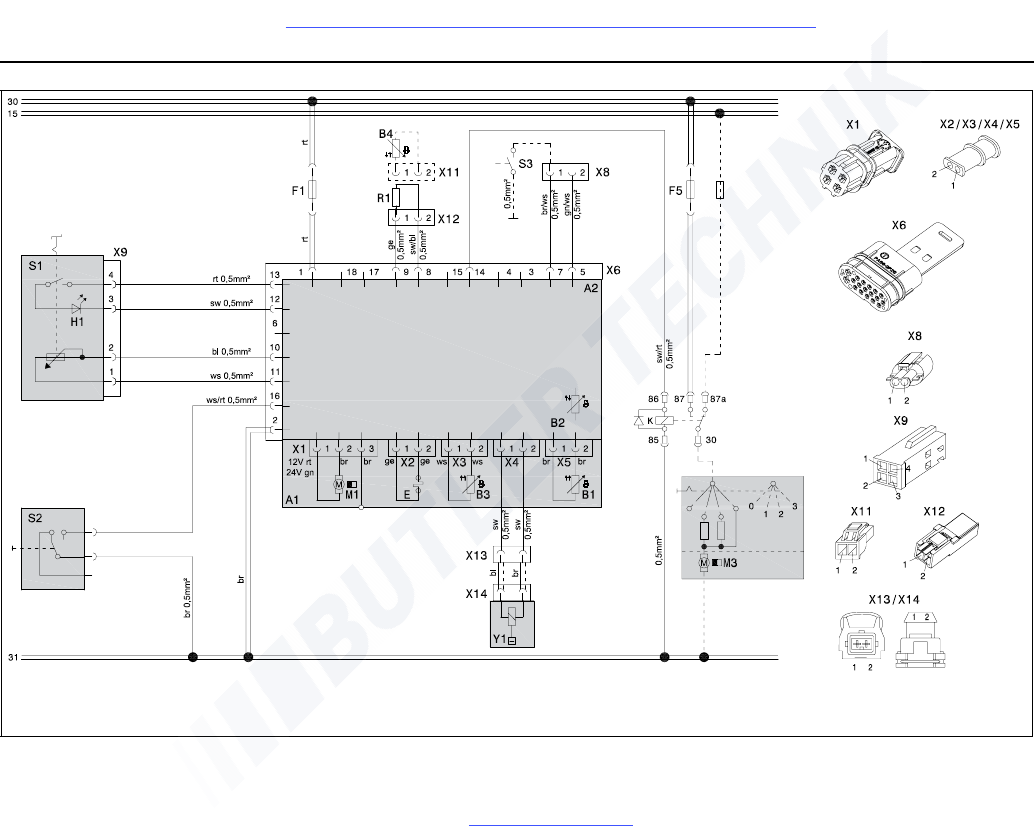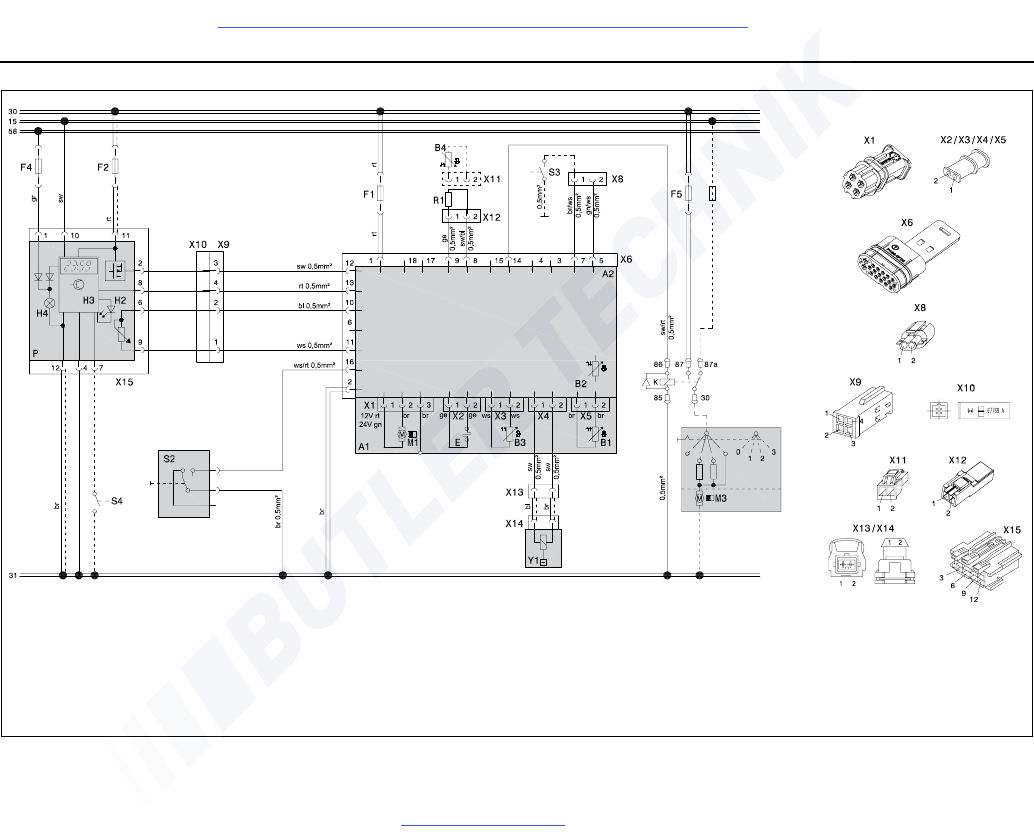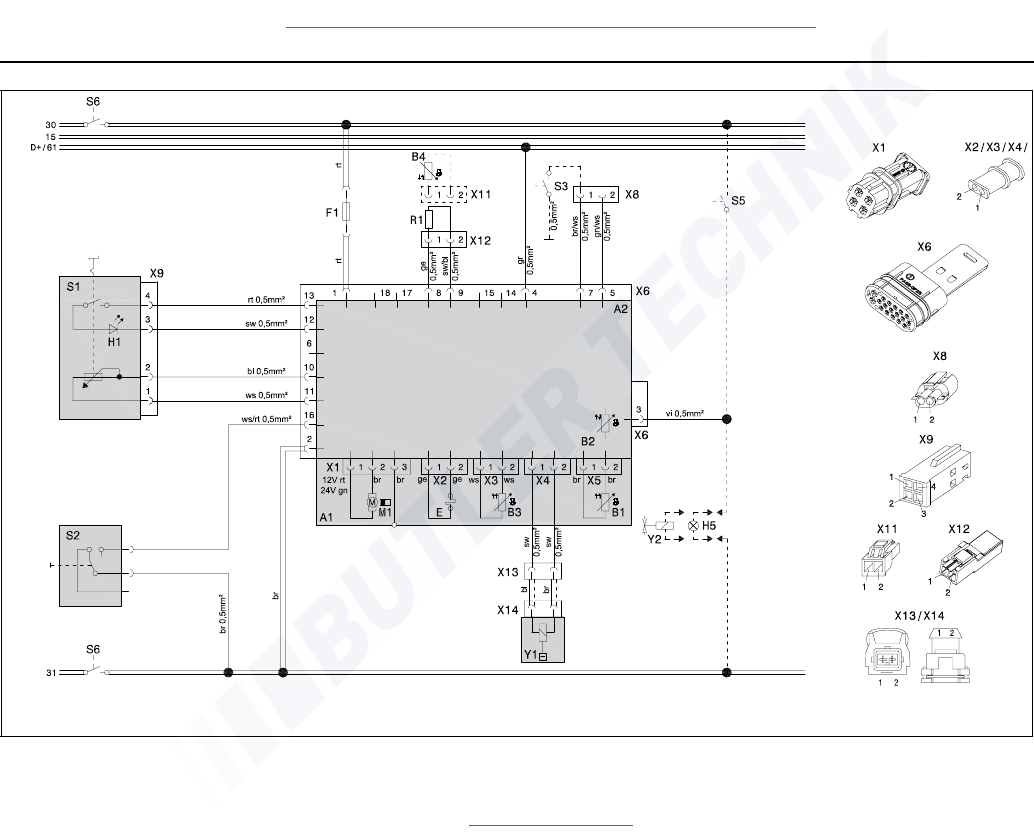Webasto Airtop 2000ST Installation Instruction 2000STD
User Manual: 2000STD
Open the PDF directly: View PDF ![]() .
.
Page Count: 44
- Inhaltsverzeichnis
- Table of Contents
- Inhoudsopgave
- 1 Statutory regulations governing installation
- 2 Use of the air heaters
- 3 Installation
- 4 Type label
- 5 Installation example
- 6 Hot air system
- 7 Fuel supply
- 8 Combustion air supply
- 9 Exhaust pipe
- 10 Combustion air inlet and exhaust lines
- 11 Electrical connections
- 12 Connection diagram/Circuit diagram
- 13 Legend for circuit diagrams
- 14 Initial start-up
- 15 Fault lock-out
- 16 Technical data
- 17 Version
- 18 Drilling template

Luftheizgeräte
Air Heaters
Luchtverwarmingsapparaten
Einbauanweisung
Installation Instructions
Montagehandleiding
Air Top 2000 ST
Handelsbezeichnungen/Trade names/Handelsnamen:
Air Top 2000 ST B (Benzin/Petrol/benzine)
Air Top 2000 ST D (Diesel/PME)
Visit www.butlertechnik.com for more technical information and downloads.
www.butlertechnik.com

Visit www.butlertechnik.com for more technical information and downloads.
www.butlertechnik.com

Das unsachgemäße Einbauen oder Reparieren von Webasto Heiz- und Kühlsystemen kann Feuer
verursachen oder zum Austritt von tödlichem Kohlenmonoxid führen. Dadurch können schwere oder töd-
liche Verletzungen hervorgerufen werden.
Für den Einbau und die Reparatur von Webasto Heiz- und Kühlsystemen bedarf es eines
Webastotrainings, technischer Dokumentation, Spezialwerkzeuge und einer Spezialausrüstung.
Es dürfen nur Originalteile von Webasto verwendet werden. Siehe dazu auch Zubehörkatalog Luft- und
Wasserheizgeräte von Webasto.
Versuchen Sie NIEMALS, Webasto Heiz- oder Kühlsysteme einzubauen oder zu reparieren, wenn Sie das
Webastotraining nicht erfolgreich abgeschlossen und dabei die notwendigen technischen
Fähigkeiten erworben haben und die für einen sachgerechten Einbau und Reparatur nötigen
technischen Dokumentationen, Werkzeuge und Ausrüstungen nicht zur Verfügung stehen.
Befolgen Sie IMMER alle Webasto Einbau- und Reparaturanleitungen, und beachten Sie alle
Warnhinweise.
Webasto übernimmt keine Haftung für Mängel und Schäden, die auf einen Einbau durch ungeschultes Per-
sonal zurückzuführen sind.
Improper installation or repair of Webasto heating and cooling systems can cause fire or the leakage of
deadly carbon monoxide leading to serious injury or death.
To install and repair Webasto heating and cooling systems you need to have completed a Webasto
training course and have the appropriate technical documentation, special tools and special equipment.
Only genuine Webasto parts may be used. See also Webasto air and water heaters accessories catalogue.
NEVER try to install or repair Webasto heating or cooling systems if you have not completed a Webasto
training course, you do not have the necessary technical skills and you do not have the technical
documentation, tools and equipment available to ensure that you can complete the installation and
repair work properly.
ALWAYS carefully follow Webasto installation and repair instructions and heed all WARNINGS.
Webasto rejects any liability for problems and damage caused by the system being installed by
untrained personnel.
Visit www.butlertechnik.com for more technical information and downloads.
www.butlertechnik.com

Air Top 2000 ST
I
Inhaltsverzeichnis
1 Gesetzliche Bestimmungen für den Einbau . . . . . . . . . . . . . 1
2 Verwendung der Luftheizgeräte . . . . . . . . . . . . . . . . . . . . . . 5
3 Einbau . . . . . . . . . . . . . . . . . . . . . . . . . . . . . . . . . . . . . . . . . . . 6
4 Typschild . . . . . . . . . . . . . . . . . . . . . . . . . . . . . . . . . . . . . . . . . 9
5 Einbaubeispiel. . . . . . . . . . . . . . . . . . . . . . . . . . . . . . . . . . . . 10
6 Heizluftsystem . . . . . . . . . . . . . . . . . . . . . . . . . . . . . . . . . . . 11
7 Brennstoffversorgung . . . . . . . . . . . . . . . . . . . . . . . . . . . . . 13
8 Brennluftversorgung . . . . . . . . . . . . . . . . . . . . . . . . . . . . . . 18
9 Abgasleitung. . . . . . . . . . . . . . . . . . . . . . . . . . . . . . . . . . . . . 19
10 Brennluftansaug- und Abgasleitungen. . . . . . . . . . . . . . . . 20
11 Elektrische Anschlüsse . . . . . . . . . . . . . . . . . . . . . . . . . . . . . 22
12 Anschlussschema / Schaltplan . . . . . . . . . . . . . . . . . . . . . . . 25
13 Legende für Schaltpläne . . . . . . . . . . . . . . . . . . . . . . . . . . . 30
14 Erstinbetriebnahme . . . . . . . . . . . . . . . . . . . . . . . . . . . . . . . 32
15 Störabschaltung . . . . . . . . . . . . . . . . . . . . . . . . . . . . . . . . . . 33
16 Technische Daten . . . . . . . . . . . . . . . . . . . . . . . . . . . . . . . . . 35
17 Ausführung . . . . . . . . . . . . . . . . . . . . . . . . . . . . . . . . . . . . . . 37
18 Bohrschablone . . . . . . . . . . . . . . . . . . . . . . . . . . . . . . . . . . . 38
Table of Contents
1 Statutory regulations governing installation . . . . . . . . . . .41
2 Use of the air heaters . . . . . . . . . . . . . . . . . . . . . . . . . . . . . .45
3 Installation . . . . . . . . . . . . . . . . . . . . . . . . . . . . . . . . . . . . . . .46
4 Type label. . . . . . . . . . . . . . . . . . . . . . . . . . . . . . . . . . . . . . . .49
5 Installation example . . . . . . . . . . . . . . . . . . . . . . . . . . . . . . .50
6 Hot air system . . . . . . . . . . . . . . . . . . . . . . . . . . . . . . . . . . . .51
7 Fuel supply . . . . . . . . . . . . . . . . . . . . . . . . . . . . . . . . . . . . . . .53
8 Combustion air supply . . . . . . . . . . . . . . . . . . . . . . . . . . . . .58
9 Exhaust pipe . . . . . . . . . . . . . . . . . . . . . . . . . . . . . . . . . . . . .59
10 Combustion air inlet and exhaust lines . . . . . . . . . . . . . . . .60
11 Electrical connections . . . . . . . . . . . . . . . . . . . . . . . . . . . . . .62
12 Connection diagram/Circuit diagram. . . . . . . . . . . . . . . . . .65
13 Legend for circuit diagrams . . . . . . . . . . . . . . . . . . . . . . . . .70
14 Initial start-up . . . . . . . . . . . . . . . . . . . . . . . . . . . . . . . . . . . .72
15 Fault lock-out . . . . . . . . . . . . . . . . . . . . . . . . . . . . . . . . . . . . .73
16 Technical data . . . . . . . . . . . . . . . . . . . . . . . . . . . . . . . . . . . .75
17 Version . . . . . . . . . . . . . . . . . . . . . . . . . . . . . . . . . . . . . . . . . .77
18 Drilling template . . . . . . . . . . . . . . . . . . . . . . . . . . . . . . . . . .78
Visit www.butlertechnik.com for more technical information and downloads.
www.butlertechnik.com

Air Top 2000 ST Statutory regulations governing installation
41
1 Statutory regulations governing installation
The Air Top 2000 ST heater unit has been type- tested and approved in ac-
cordance with Directives 72/245/EEC (EMC), 2001/56/EC (heater) and ECE
R122 with the following permit numbers:
e1*72/245*2009/19*1085*__
e1*2001/56*2006/119*0022*__
Primarily the regulations of Annex VII of the Directive 2001/56/EC and Part
I and Annex 7 of the directive ECE R122 must be observed for the installa-
tion.
NOTE:
The specifications of this Directive are binding in the scope of the
Basic Directive EEC/70/156 and/or EC/2007/46 (for new vehicle
models from 29/04/2009) and should also be observed in countries
in which no special regulations exist.
See chapter 1.2, "Extract of the directives 2001/56/EG Annex VII and
ECE R122 Part I and Annex 7" and chapter 1.3, "Extract of the direc-
tives 2001/56/EG Annex IX and ECE R122 Annex 9".
IMPORTANT
Failure to follow the installation instructions and the notes contained
therein will lead to all liability being refused by Webasto. The same applies
if repairs are carried out incorrectly or with the use of parts other than gen-
uine spare parts. This will result in the invalidation of the type approval for
the heater and therefore of its homologation / EC/ECE type licence.
1.1. Application of combustion heaters in vehicles for transport-
ing dangerous goods
Vehicles for the purpose of transporting dangerous goods will be type test-
ed in accordance with the standard ECE R105. The following measures are
derived for our combustion heaters:
• The electrical cable/wiring harness must be sufficiently dimensioned to
prevent overheating. The electrical cable/wiring harness must be suffi-
ciently insulated. All power circuits must be protected with fuses or au-
tomatic circuit-breakers.
• The cables must be securely fastened and routed so that they are suffi-
ciently protected against mechanical and thermal loading.
• The combustion heaters must be type-tested in accordance with the
standard ECE R122 (equivalent to EC/2001/56 in the version EC/2006/
119) and comply with the Appendix 9 – Additional regulations for ve-
hicles for transporting dangerous goods.
•The combustion heaters and their exhaust gas routing shall be de-
signed, located, protected or covered so as to prevent any unacceptable
risk of heating or ignition of the load.
• In the event of any leakage of the fuel line, the fuel shall drain to the
ground without coming into contact with hot parts of the vehicle or the
load;
• The exhaust system as well as the exhaust pipes shall be so directed or
protected to avoid any danger to the load through heating or ignition.
Parts of the exhaust system situated directly below the fuel tank shall
have a clearance of at least 100 mm or be protected by a thermal shield.
• The combustion heater may only be switched on manually. Program-
ming devices shall be prohibited. The combustion heater may be
switched on again manually after the vehicle engine has been switched
off.
Visit www.butlertechnik.com for more technical information and downloads.
www.butlertechnik.com

Statutory regulations governing installation Air Top 2000 ST
42
Requirement for basic unit:
A maximum run-on period of 40 seconds is permitted when the combus-
tion heater is switched off. Only combustion heaters with heat exchangers
that are approved for this reduced run-on time of 40 seconds may be used.
1.2. Extract of the directives 2001/56/EG Annex VII and ECE R122
Part I and Annex 7
Start of extract.
ANNEX VII
REQUIREMENTS FOR COMBUSTION HEATERS AND THEIR
INSTALLATION
1. GENERAL REQUIREMENTS
1.7.1. / 7.1. (Annex 7) A clearly visible tell-tale in the operator's
field of view shall inform when the combustion heater is switched
on or off.
2. / 5.3. (Part I) VEHICLE INSTALLATION REQUIREMENTS
2.1. / 5.3.1. (Part I) Scope
2.1.1. / 5.3.1.1. (Part I) Subject to paragraph 2.1.2. / 5.3.1.2. (Part
I) combustion heaters shall be installed according to the require-
ments of this Annex.
2.1.2. / 5.3.1.2. (Part I) Vehicles of category O having liquid fuel
heaters are deemed to comply with the requirements of this An-
nex.
2.2. / 5.3.2. (Part I) Positioning of heater
2.2.1. / 5.3.2.1. (Part I) Body sections and any other components
in the vicinity of the heater must be protected from excessive heat
and the possibility of fuel or oil contamination.
2.2.2. / 5.3.2.2. (Part I) The combustion heater shall not constitute
a risk of fire, even in the case of overheating. This requirement
shall be deemed to be fulfilled if the installation ensures an ade-
quate distance to all parts and suitable ventilation, by the use of
fire resistant materials or by the use of heat shields.
2.2.3. / 5.3.2.3. (Part I) In the case of M2 and M3 vehicles, the
heater must not be positioned in the passenger compartment.
However, an installation in an effectively sealed envelope which
also complies with the conditions in paragraph 2.2.2. / 5.3.2.2.
(Part I) may be used.
2.2.4. / 5.3.2.4. (Part I) The label referred to in paragraph 1.4 / An-
nex 7 paragraph 1.4. or a duplicate, must be positioned so that it
can be easily read when the heater is installed in the vehicle.
2.2.5. / 5.3.2.5. (Part I) Every reasonable precaution should be tak-
en in positioning the heater to minimise the risk of injury and dam-
age to personal property.
2.3. / 5.3.3. (Part I) Fuel supply
2.3.1. / 5.3.3.1. (Part I) The fuel filler must not be situated in the
passenger compartment and must be provided with an effective
cap to prevent fuel spillage.
2.3.2. / 5.3.3.2. (Part I) In the case of liquid fuel heaters, where a
supply separate to that of the vehicle is provided, the type of fuel
and its filler point must be clearly labelled.
Visit www.butlertechnik.com for more technical information and downloads.
www.butlertechnik.com

Air Top 2000 ST Statutory regulations governing installation
43
2.3.3. / 5.3.3.3. (Part I) A notice, indicating that the heater must
be shut down before refuelling, must be affixed to the fuelling
point. In addition a suitable instruction must be included in the
manufacturer's operating manual.
2.4. / 5.3.4. (Part I) Exhaust system
2.4.1. / 5.3.4.1. (Part I) The exhaust outlet must be located so as
to prevent emissions from entering the vehicle through ventilators,
heated air inlets or opening windows.
2.5. / 5.3.5. (Part I) Combustion air inlet
2.5.1. / 5.3.5.1. (Part I) The air for the combustion chamber of the
heater must not be drawn from the passenger compartment of
the vehicle.
2.5.2. / 5.3.5.2. (Part I) The air inlet must be so positioned or
guarded that blocking by rubbish or luggage is unlikely.
2.6. / 5.3.6. (Part I) Heating air inlet
2.6.1. / 5.3.6.1. (Part I) The heating air supply may be fresh or re-
circulated air and must be drawn from a clean area not likely to be
contaminated by exhaust fumes emitted either by the propulsion
engine, the combustion heater or any other vehicle source.
2.6.2. / 5.3.6.2. (Part I) The inlet duct must be protected by mesh
or other suitable means.
2.7. / 5.3.7. (Part I) Heating air outlet
2.7.1. / 5.3.7.1. (Part I) Any ducting used to route the hot air
through the vehicle must be so positioned or protected that no in-
jury or damage could be caused if it were to be touched.
2.7.2. / 5.3.7.2. (Part I) The air outlet must be so positioned or
guarded that blocking by rubbish or luggage is unlikely.
2.8. / 5.3.8. (Part I) Automatic control of the heating system
2.8. / 5.3.8.1. (Part I) The heating system must be switched off au-
tomatically and the supply of fuel must be stopped within five sec-
onds when the vehicle's engine stops running. If a manual device
is already activated, the heating system can stay in operation.
End of extract.
NOTE:
Contrary to point 2.2.3 / 5.3.2.3 (Part I)the heater must also not be in-
stalled in the passenger cabin of class M1 and N vehicles. However, an in-
stallation in an effectively sealed envelope which also complies with the
conditions in paragraph 2.2.2. / 5.3.2.2. (Part I) may be used.
Visit www.butlertechnik.com for more technical information and downloads.
www.butlertechnik.com

Statutory regulations governing installation Air Top 2000 ST
44
1.3. Extract of the directives 2001/56/EG Annex IX and ECE R122
Annex 9
Start of extract.
ANNEX IX / 9
3. Technical specifications for heater units for installation in
dangerous goods transporters (Annex 9)
3.1. General (EX/II, EX/III, AT, FL and OX vehicles)
3.1.1. The combustion heaters and their exhaust gas routing shall
be designed, located, protected or covered so as to prevent any
unacceptable risk of heating or ignition of the load. This require-
ment shall be considered as fulfilled if the fuel tank and the ex-
haust system of the appliance conform to the provisions set out in
the points 3.1.1.1 and 3.1.1.2. Compliance with those provisions
shall be verified on the completed vehicle.
3.1.1.1. Any fuel tanks for supplying the appliance shall meet the
following requirements:
a) in the event of any leakage, the fuel shall drain to the
ground without coming into contact with hot parts of the
vehicle or the load;
b) fuel tanks containing petrol shall be equipped with an ef-
fective flame trap at the filler opening or with a closure en-
abling the opening to be kept hermetically sealed.
3.1.1.2. The exhaust system as well as the exhaust pipes shall be
so directed or protected to avoid any danger to the load through
heating or ignition. Parts of the exhaust system situated directly
below the fuel tank (diesel) shall have a clearance of at least
100 mm or be protected by a thermal shield.
3.1.2. The combustion heater shall be switched on manually. Pro-
gramming devices shall be prohibited.
3.2. EX/II and EX/III vehicles
Combustion heaters using gaseous fuels are not permitted.
3.3. FL vehicles
3.3.1. The combustion heaters shall be put out of operation by at
least the following methods:
a) intentional manual switching off from the driver’s cab;
b) stopping of the vehicle engine; in this case the heating de-
vice may be restarted manually by the driver;
c) start-up of a feed pump on the motor vehicle for the dan-
gerous goods carried.
End of extract.
Visit www.butlertechnik.com for more technical information and downloads.
www.butlertechnik.com

Air Top 2000 ST Use of the air heaters
45
2 Use of the air heaters
The Webasto Air Top 2000 ST air heaters are designed
– to heat cabins, boats, trucks, minibuses, vans and motorhomes
– to defrost vehicle windows
The heaters operate independently of the engine and are connected direct-
ly to the fuel tank and the electrical system of the vehicle.
They may be used for vehicles with either water or air-cooled engines.
They are not designed for heating hazardous substances.
Visit www.butlertechnik.com for more technical information and downloads.
www.butlertechnik.com
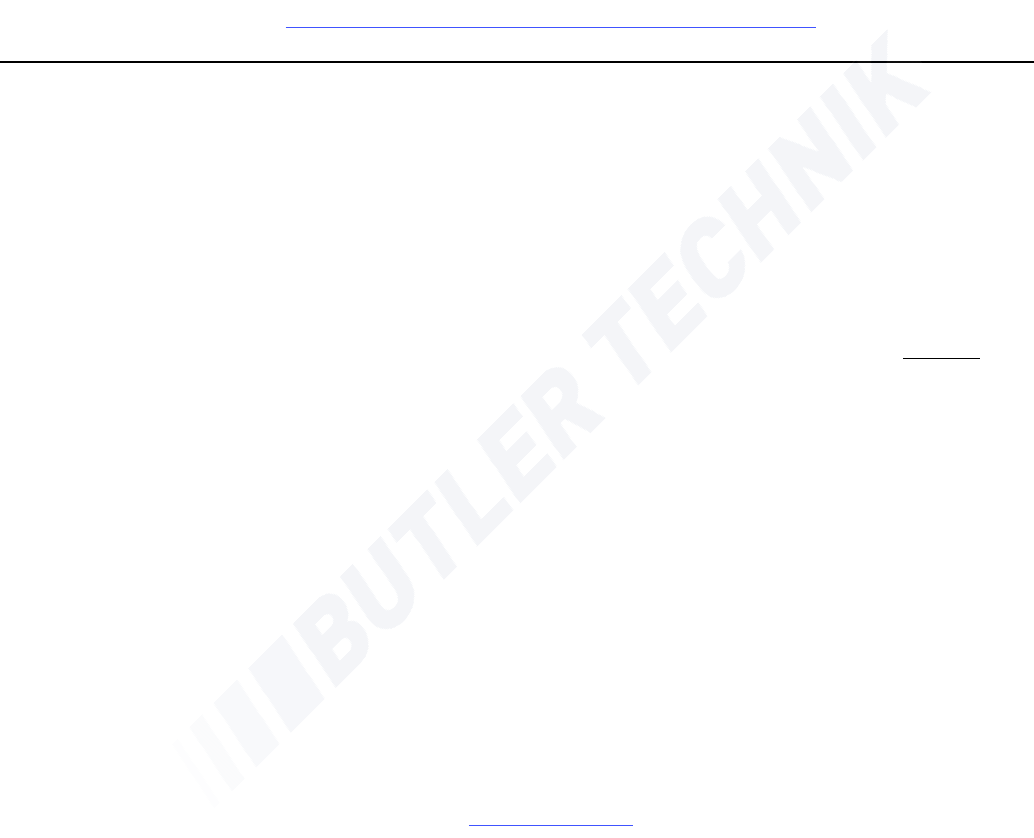
Installation Air Top 2000 ST
46
3Installation
IMPORTANT
The statutory regulations governing installation on pages 1 and 2 must be
adhered to. The requirements of the latest version of the ADR must also be
observed for the installing the heater into vehicles used to transport haz-
ardous substances.
The heater must not be operated without the control unit cover (this will
cause the heater to overheat).
3.1. Air Top 2000 ST installation situation
NOTE:
Check the installation situation of the relevant vehicle type.
3.2. Installation location
The heater may be fitted both in the interior or on the exterior of the vehi-
cle.
When using the vehicle in normal road traffic, the heater may only be in-
stalled with contact protection if it is located within reach of the driver.
If it is installed on the exterior ensure that the heater is fitted in a position
where it is protected from splashing water and spray.
The heater must be installed in such a way that no water can ingress into
it if the vehicle travels through a water hazard for which that vehicle is li-
censed.
The openings for the combustion air inlet port, the exhaust outlet port and
the fuel pipe must be sealed if the heater is installed in the interior. The seal
designed and supplied for this purpose must be used (see Figure 3).
We recommend that petrol heaters be installed with the exhaust port
pointing vertically downwards.
3.3. To install the heater
The M6 nuts must be tightened with a torque of 6 Nm +1 Nm for installing
the Air Top 2000 ST heater.
The installation dimensions and space requirement for service access are
shown in the installation drawing (Figure 1). The specified horizontal and
axial angles must not be exceeded (Figure 2).
A seal (Figure 3) must be fitted between the heater and the vehicle body.
This seal must be replaced each time the heater is installed. The sup-
port area for the heater foot must be flat. A special tools can be pur-
chased from Webasto to drill the holes and, if necessary, smooth the sup-
port area. The seal can compensate for unevenness of max. 1 mm.
IMPORTANT
After installation, check that the casing is not in contact with any parts of
the vehicle body. A failure to do this may result in the hot air fan blocking.
Visit www.butlertechnik.com for more technical information and downloads.
www.butlertechnik.com
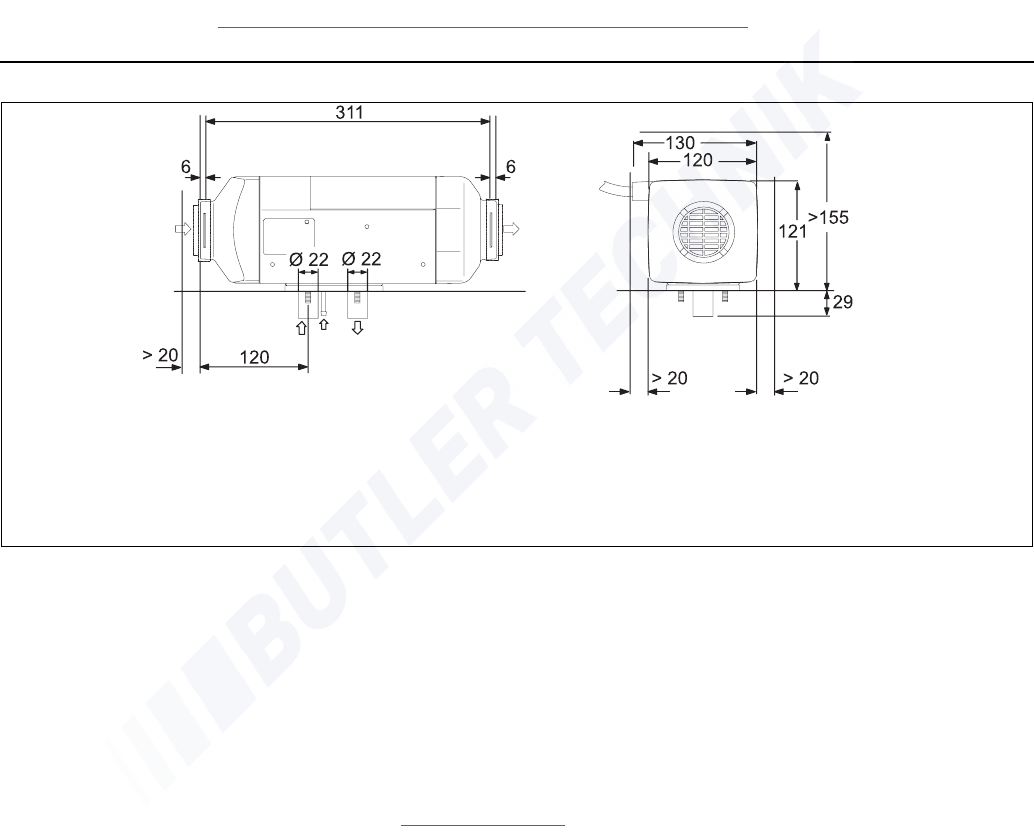
Air Top 2000 ST Installation
47
Fig. 1: Dimensions of the heater
1Hot air inlet
2 Hot air outlet
3 Combustion air intake
4 Exhaust fume outlet
5 Fuel intake
6 Space requirement for hot air inlet
7 Space requirement for removing the heater
8 Cable outlet (either right or left)
12
354
7
8
6
Visit www.butlertechnik.com for more technical information and downloads.
www.butlertechnik.com
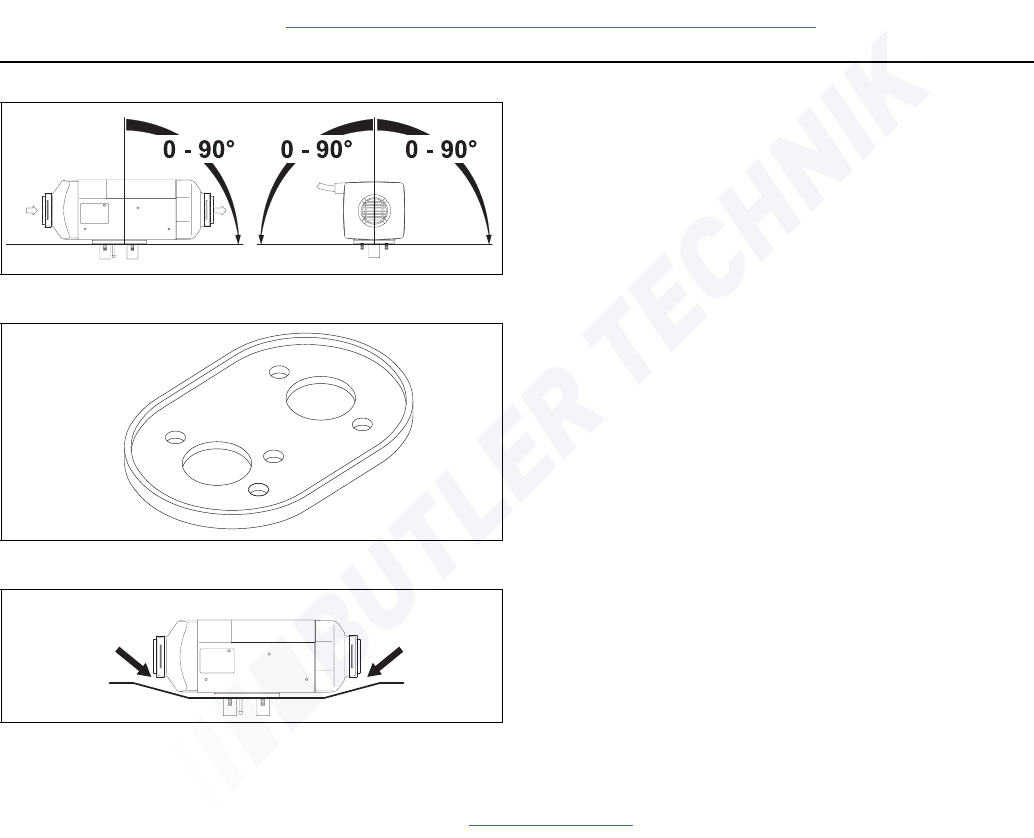
Installation Air Top 2000 ST
48
Fig. 2: Recommended installation positions for diesel heaters
Fig. 3: Seal
Fig. 4: Installation
Ensure that all moving parts can move easily!
Visit www.butlertechnik.com for more technical information and downloads.
www.butlertechnik.com
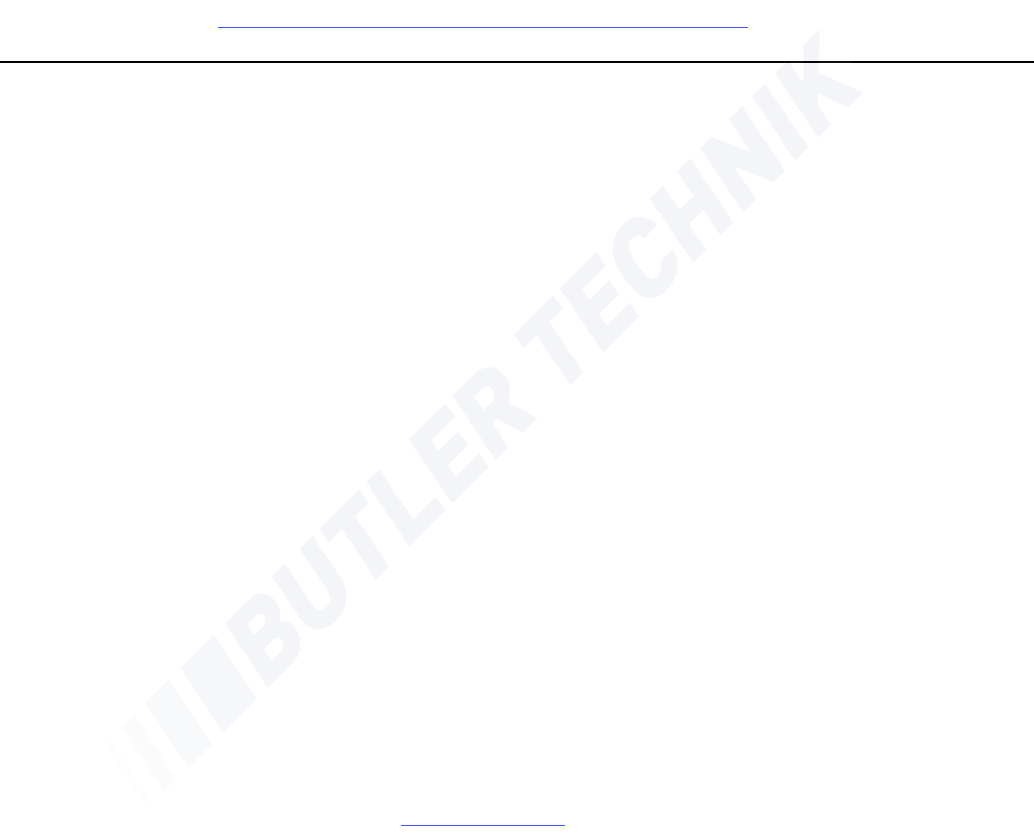
Air Top 2000 ST Type label
49
4Type label
The model plate must be positioned so that it cannot be damaged and
must be clearly legible when the heater is installed (otherwise a duplicate
model plate must be used).
Inapplicable years must be erased from the model plate.
Visit www.butlertechnik.com for more technical information and downloads.
www.butlertechnik.com
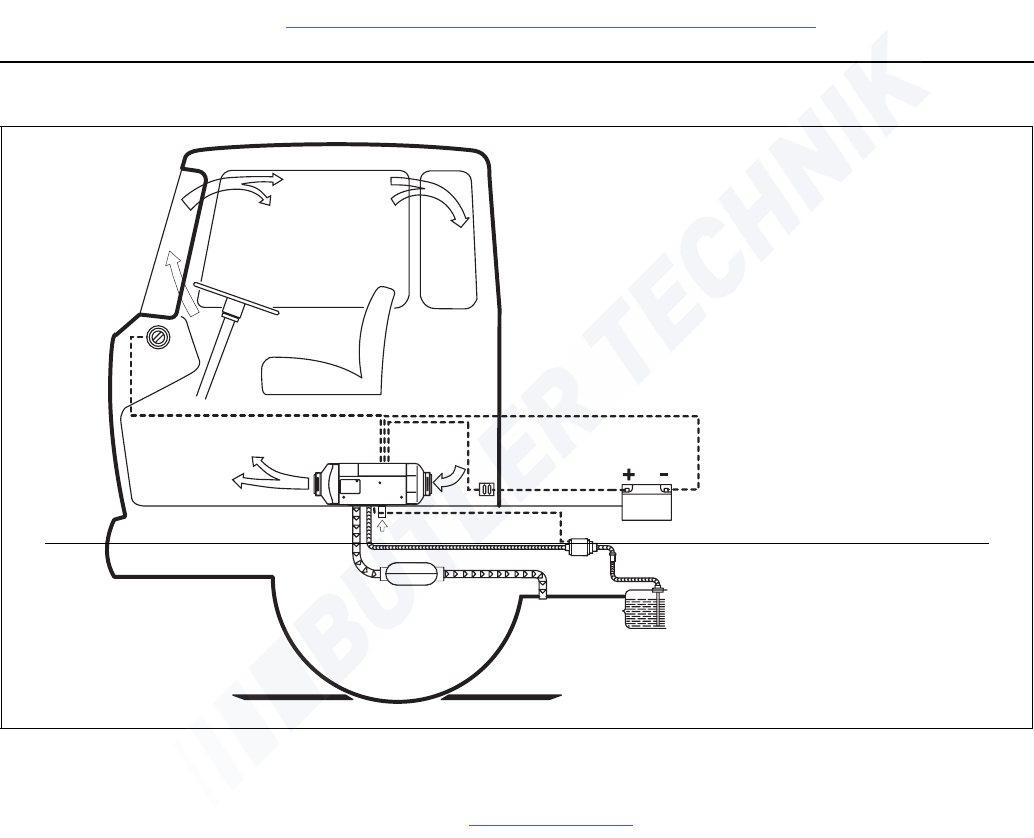
Installation example Air Top 2000 ST
50
5 Installation example
Fig. 5: Installation example for air heater in recirculation mode
1 Control element
2Heater
3 Metering pump
4 Fuel filter (accessory)
5 Tank connector
6 Exhaust silencer (accessory)
7Fuse
Maximum
water passage height
1
2
3
5
4
7
6
Visit www.butlertechnik.com for more technical information and downloads.
www.butlertechnik.com
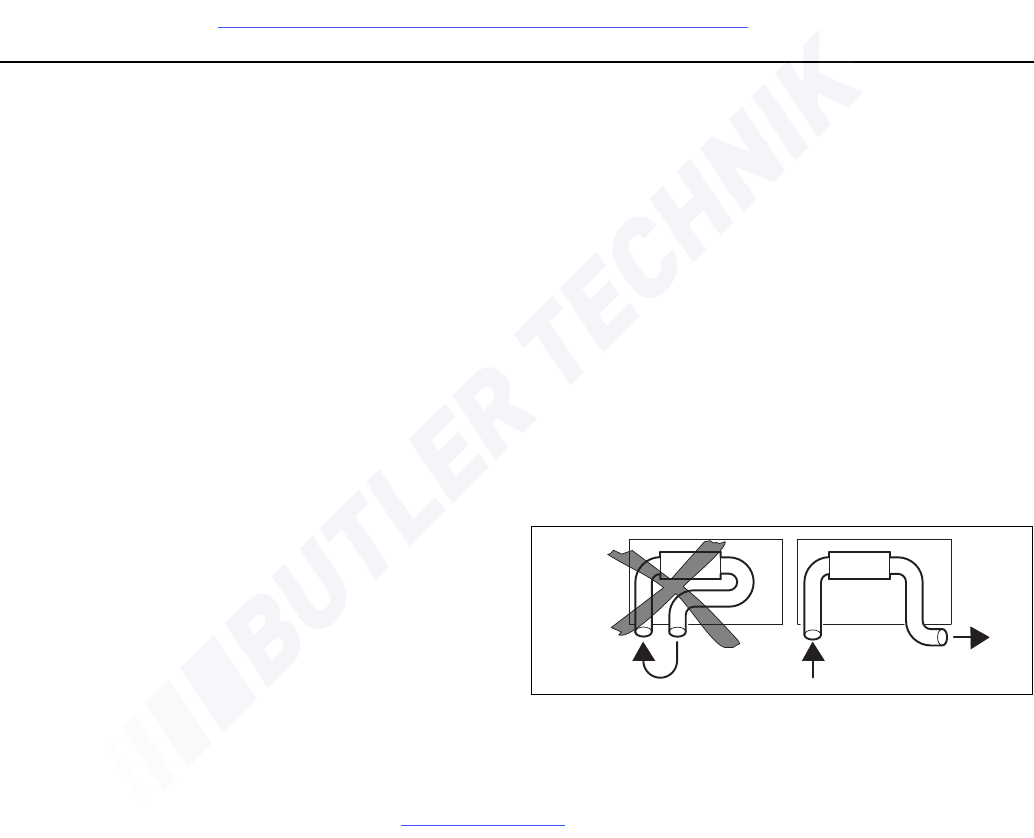
Air Top 2000 ST Hot air system
51
6 Hot air system
NOTE:
The heater must not be integrated into the vehicle’s air system.
Inside the control unit there is a temperature sensor, which operates the
heater in the appropriate heat output range in conjunction with the control
element depending on the intake temperatures and the position of the set-
point generator. The heat output is controlled such that after the selected
interior temperature has been reached quickly, it is then kept at this select-
ed value.
Both recirculation and fresh air modes are possible.
For fresh air mode it must be ensured that the hot air is taken from an area
protected from splashing water and spray and in such a way that no water
can ingress into the heater if the vehicle travels through a water hazard for
which that vehicle is licensed.
NOTE:
For fresh air mode an external temperature sensor must be fitted in the ap-
propriate zone.
The internal diameter of the main section of the hot air line should be 60
mm.
NOTE:
Only materials that can permanently withstand temperatures of at least
130 °C may be used for the hot air line. The hot air opening is to be posi-
tioned in such a way that the air is not blown on to any parts that cannot
withstand the heat.
IMPORTANT
In vehicles used to transport people, the air outlet opening is to be directed
in such a way that it is at least 20 cm away from all body parts.
Maximum pressure drop between the inlet and outlet side of the hot air
line:
Air Top 2000 ST 1.5 hPa
1 hPa corresponds to 1 mbar corresponds to 10mm WC (water column).
The heaters check the internal temperature rise automatically each time
they are switched on. If this is above the specified limits, the start is can-
celled and error messages F10 is displayed. To ensure that the heater func-
tions stably, the flow resistance of the connected hot air system must be
reduced.
The points table for air guide parts in the Webasto catalogue may be used
to design the hot air system.
The hot air hose must be secured at its connection points.
If the heater is used in recirculation mode without a hot air guide, do not
short circuit the hot air flow.
Fig. 6: Hot air inlet and hot air outlet
Visit www.butlertechnik.com for more technical information and downloads.
www.butlertechnik.com
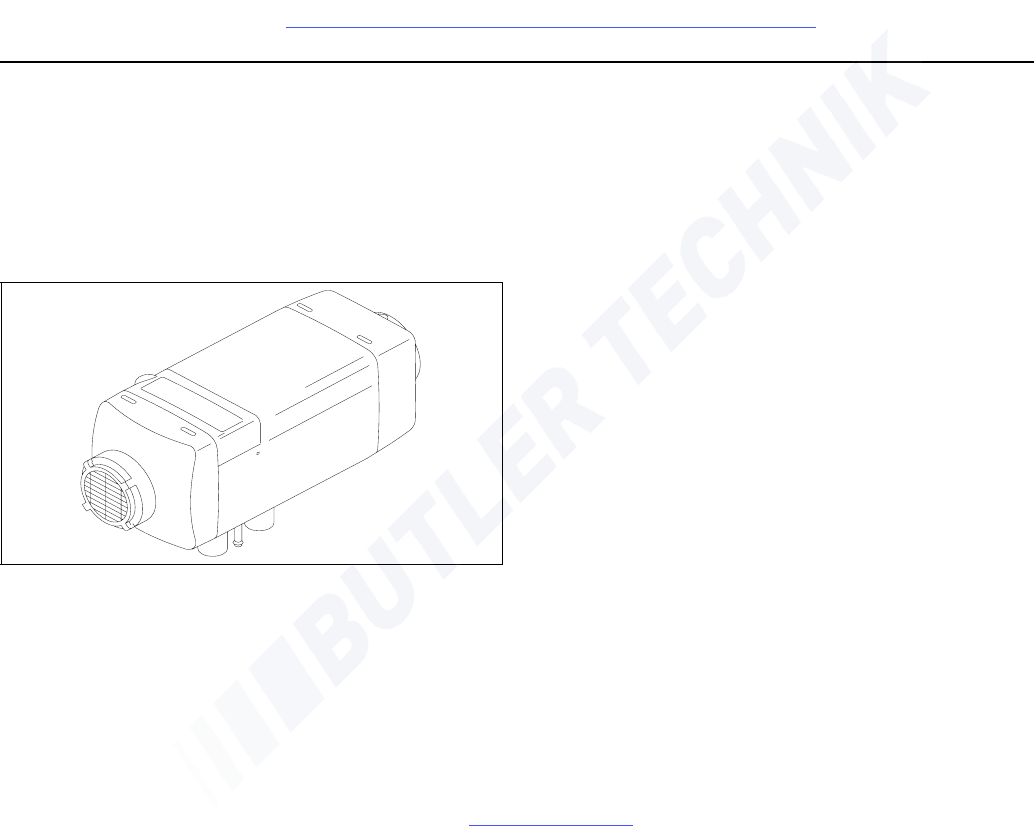
Hot air system Air Top 2000 ST
52
IMPORTANT
If you use the heater without a hot air inlet hose, the inlet grille supplied
with the heater must be used at all times.
NOTE:
The installation must be checked for:
– Air short circuit between the vehicle’s heating system and the heater air
inlet
– Air short circuit between the heater’s air inlet and the heater’s air outlet
(Figure 6)
If you use an installation box the air vent must be sealed in such a way that
no hot air can get into the installation box.
6.1. External temperature sensor
For fresh air mode an external temperature sensor must be fitted in the ap-
propriate zone.
6.1.1. To install the external temperature sensor
The external temperature sensor must be installed at medium height in the
passenger cabin on vertical surfaces if possible in the area that requires
heating.
The temperature sensor must not
–be in the direct current of hot air (from the vehicle’s own heating system
or the hot air heater).
– by close to heat sources (for example the vehicle’s own heating system).
– be placed in direct sunlight (for example on the dashboard).
– be installed behind curtains or the like.
Fig. 7: Hot air inlet with inlet grille
Visit www.butlertechnik.com for more technical information and downloads.
www.butlertechnik.com

Air Top 2000 ST Fuel supply
53
7 Fuel supply
The fuel is taken from the vehicle fuel tank or from a separate fuel tank.
The values for the maximum pressure at the fuel extraction point are
shown in Figure 8.
Only for ADR: The statutory regulation of ADR (Accord européen relatif au
transport international des marchandises dangereuses par route) govern-
ing fuel tanks, part 9 paragraph 9.2.4.7, must be adhered to.
A sign must be affixed to the fuel filler neck warning that the heater must
be switched off before refuelling. .
Permissible fuel inflow
height H (m)
At max. perm. pressure (bar)
in fuel line
0,00 0,2
1,00 0,11
2,00 0,03
Maximum fuel intake
height S (m)
At max. perm. negative pres-
sure (bar) in the fuel tank
0,00 -0,10
0,50 -0,06
1,00 -0,02
Fig. 8: Fuel supply
l1 + l2 ≤ 10 m
l2 ≤ 1.2 m
l2 ≤ 8.8 m
Visit www.butlertechnik.com for more technical information and downloads.
www.butlertechnik.com
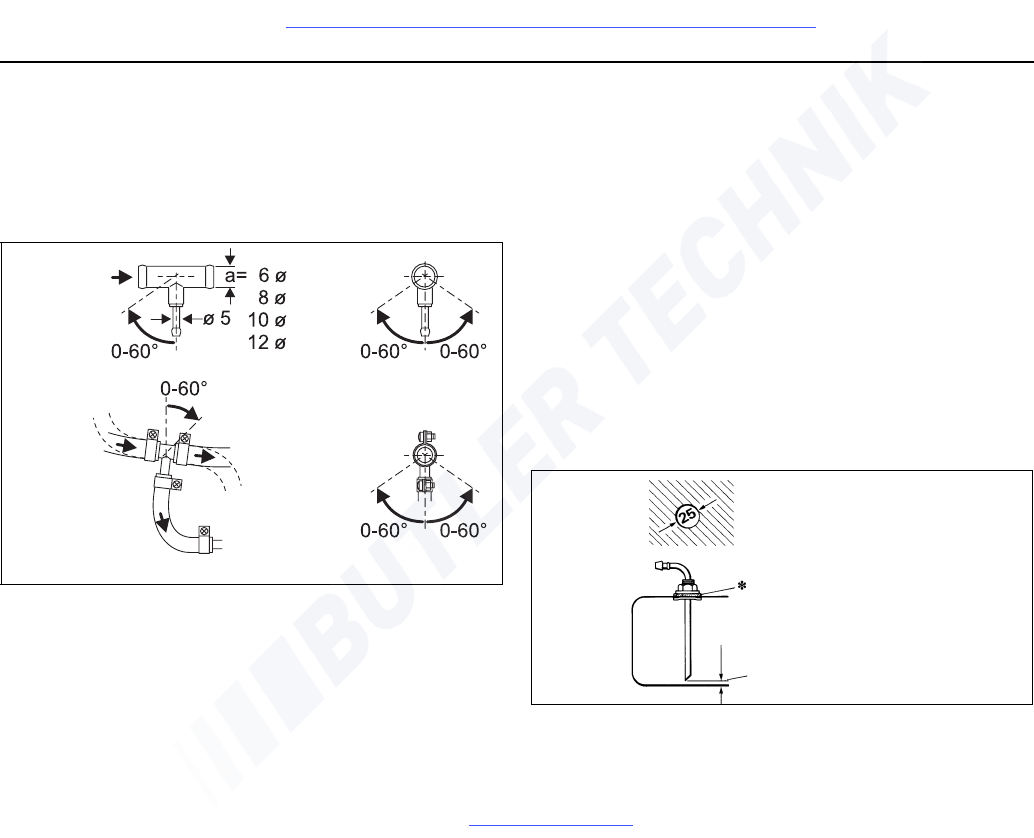
Fuel supply Air Top 2000 ST
54
7.1. Vehicles with carburettor engines
The fuel may only be extracted using the special Webasto fuel extractor
(see Figure 9) as close to the tank as possible. The connect may be made
in either the supply or return line, in which case the return line must lead
almost to the base of the tank (see Figure 10).
The fuel extractor must be fitted in such a way that any air or gas bubbles
are automatically discharged towards the tank (see Figure 9).
The fuel extractor should not be located near the engine, as gas bubbles
may form in the lines on account of heat radiated from the engine. This
may cause problems during combustion.
7.2. Vehicles with injection engines
When installing the heater in a vehicle with fuel injection system, it is im-
portant to establish whether the vehicles fuel pump is located inside or
outside the tank.
If the fuel pump is located inside the tank, fuel can only be extracted from
the return line using the Webasto fuel extractor (see Figure 9), in which
case it must be checked to ensure that the fuel return pipe in the tank ter-
minates near the bottom of the fuel tank (see Figure 10 for details of the
minimum distance from the bottom of the tank). If this is not the case We-
basto fuel extractor (see Figure 10, 11 and 12) may be used.
If the fuel pump is installed outside the tank, the fuel connection may also
be made between the tank and the fuel pump, again using only the We-
basto fuel extractor (see Figure 9).
7.3. Vehicles with diesel engines
The fuel must be taken from the vehicle fuel tank or from a separate tank
(see Figs. 9, 10 and 11). This separate fuel pick-up precludes any effect of
pressure.
Fig. 9: Webasto fuel extractor
to metering pump
to engine
from tank
Fig. 10: Webasto tank connector
Hole pattern
Minimum distance 25 mm
Only use a tank connector if the fuel
tank is made from metal
Visit www.butlertechnik.com for more technical information and downloads.
www.butlertechnik.com

Air Top 2000 ST Fuel supply
55
NOTE:
The tank fitting must be made from metal!
7.4. Fuel lines
Only steel, copper and plastic lines of plasticised, light and temperature-
stabilised PA 11 or PA 12 (e.g. Mecanyl RWTL) pursuant to DIN 73378 may
be used for the fuel lines.
Since the lines normally cannot be routed with a constant rising gradient,
the internal diameter must not be allowed to exceed a certain size. Air or
gas bubbles will accumulate in lines with an internal diameter of more than
4 mm and these will cause malfunctions whilst the heater is operating if
the lines sag or are routed downwards. The diameters specified in Figure 8
will ensure that bubbles do not form.
The lines should not be routed downwards from the metering pump to the
heater.
Unsupported fuel lines must be secured to prevent them sagging. They
must be installed in such a way that they cannot be damaged by flying road
chippings and high temperatures (exhaust line).
The fuel lines must be secure at the connections using hose clips to prevent
their slipping.
Fig. 11: Fuel pick-up from the plastic tank
(Pick-up via tank drain screw)
Fig. 12: Fuel pick-up from the plastic tank
(Pick-up via tank fitting)
Sealing ring
Plastic tank
Sealing ring
Tank connector
Tank fitting
Visit www.butlertechnik.com for more technical information and downloads.
www.butlertechnik.com
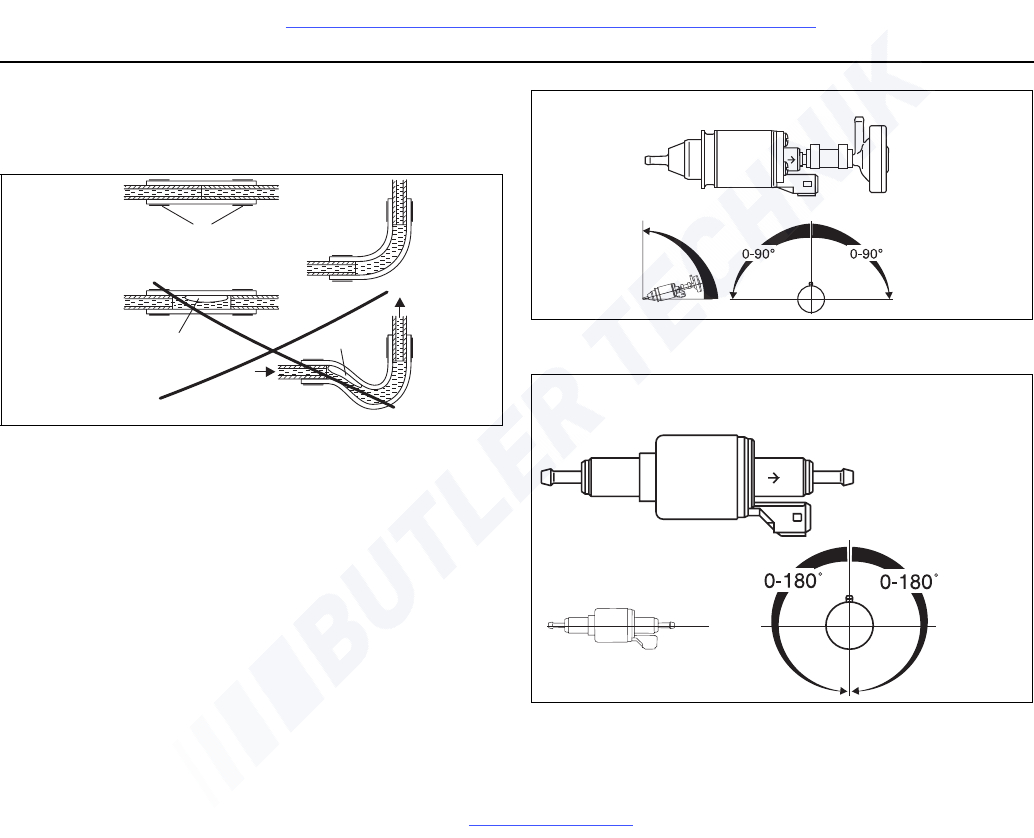
Fuel supply Air Top 2000 ST
56
7.4.1. Connecting two pipes with a hose
The correct procedure for connecting fuel lines with hosing is shown in Fig-
ure 13.
Ensure that there are no leaks.
7.5. Metering pump
The metering pump is a combined delivery, metering and shut-off system
and is subject to certain installation criteria (see Figures 8, 14 and 15).
7.5.1. Installation location
The metering pump must be installed in a cool place as close as possible to
the tank (see Figure 8). The maximum ambient temperature must not ex-
ceed +20 °C for petrol heaters at any time during operation.
The metering pump and fuel lines must not be installed within range of the
radiated heat from hot vehicle parts. A heat shield must be used if neces-
sary.
Fig. 13: Pipe / hose connection
Clip
Bubble
Correct
Wrong
Bubble
Fig. 14: Metering pump DP 2 with damper
Installation position
Fig. 15: Metering pump DP 30.2
Installation position
Air Top 2000 ST 12 V - petrol
Preferably
15° - 90°
Installation posi-
tion of damper
Metering
pump
Air Top 2000 ST
12 V and 24 V - diesel
Installation
position of
damper
Horizontal installation
Visit www.butlertechnik.com for more technical information and downloads.
www.butlertechnik.com

Air Top 2000 ST Fuel supply
57
7.5.2. Installation and attachment
The metering pump must be secured with a vibration-damping mounting
(for example a rubberised clip). Its installation position is limited as shown
in Figures 14 and 15 in order to ensure effective automatic bleeding.
As a result of the risk of corrosion, only genuine Webasto parts may be
used for the plug connections between the metering pump and the meter-
ing pump wiring harness.
7.6. Fuel filter
Only a Webasto filter, order no. 487 171, is allowed to be used if the fuel
is expected to be contaminated. Install vertically if possible, however at
least horizontally (check flow direction).
Fig. 16: Fuel filter
0° - 90°
Visit www.butlertechnik.com for more technical information and downloads.
www.butlertechnik.com
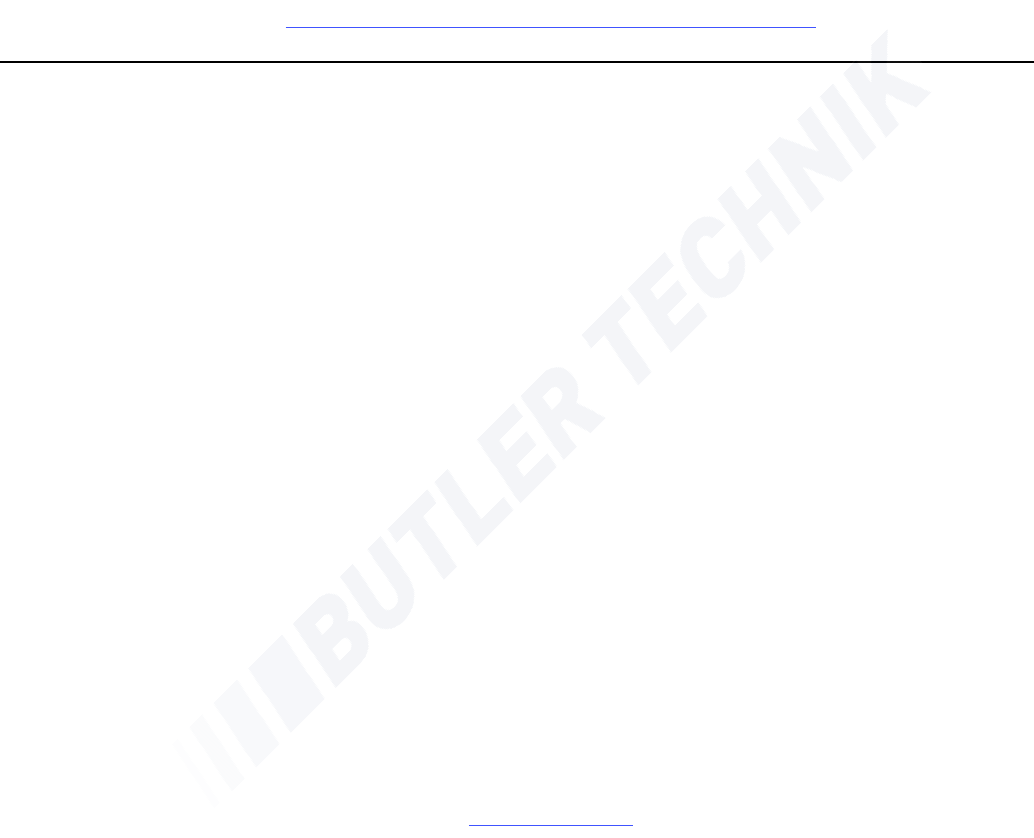
Combustion air supply Air Top 2000 ST
58
8 Combustion air supply
Under no circumstances may the combustion air be taken from areas oc-
cupied by people. The combustion air intake opening must not point in the
direction of travel. It must be located so that it cannot become clogged
with dirt.
NOTE:
An intake silencer must be fitted if the intake hose length is shorter
than 0.6 m.
NOTE:
The combustion air must be extracted using a combustion air line from a
position that is as cool as possible and protected from splashing water.
Do not use an exhaust line as the combustion air line since otherwise the
metering pump cable from the combustion air inlet port may be damaged.
The combustion air opening must not be under the minimum water drive-
through level permitted for the vehicle.
See the statutory regulations for the installation for further regulations.
Visit www.butlertechnik.com for more technical information and downloads.
www.butlertechnik.com
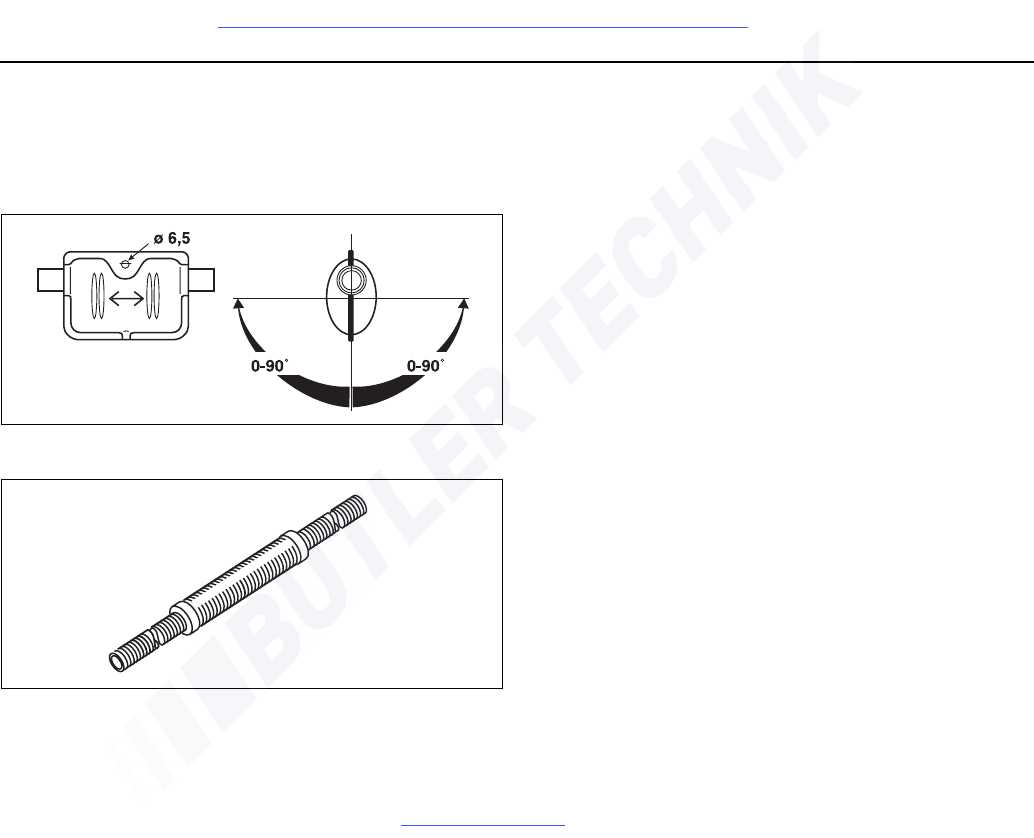
Air Top 2000 ST Exhaust pipe
59
9 Exhaust pipe
Rigid pipes of unalloyed or alloyed steel with a minimum wall thickness of
1.0 mm or flexible piping of alloyed steel only must be used as exhaust line.
The exhaust pipe is secured to the heater using a clamping collar, for ex-
ample. See the statutory regulations for other requirements.
The exhaust silencer should ideally be installed near the heater.
The heater may also be operated without a silencer.
Fig. 17: Exhaust silencer
Arbitrary flow direction
Fig. 18: Exhaust silencer for boat applications
Flow direction and installation position arbitrary
Visit www.butlertechnik.com for more technical information and downloads.
www.butlertechnik.com
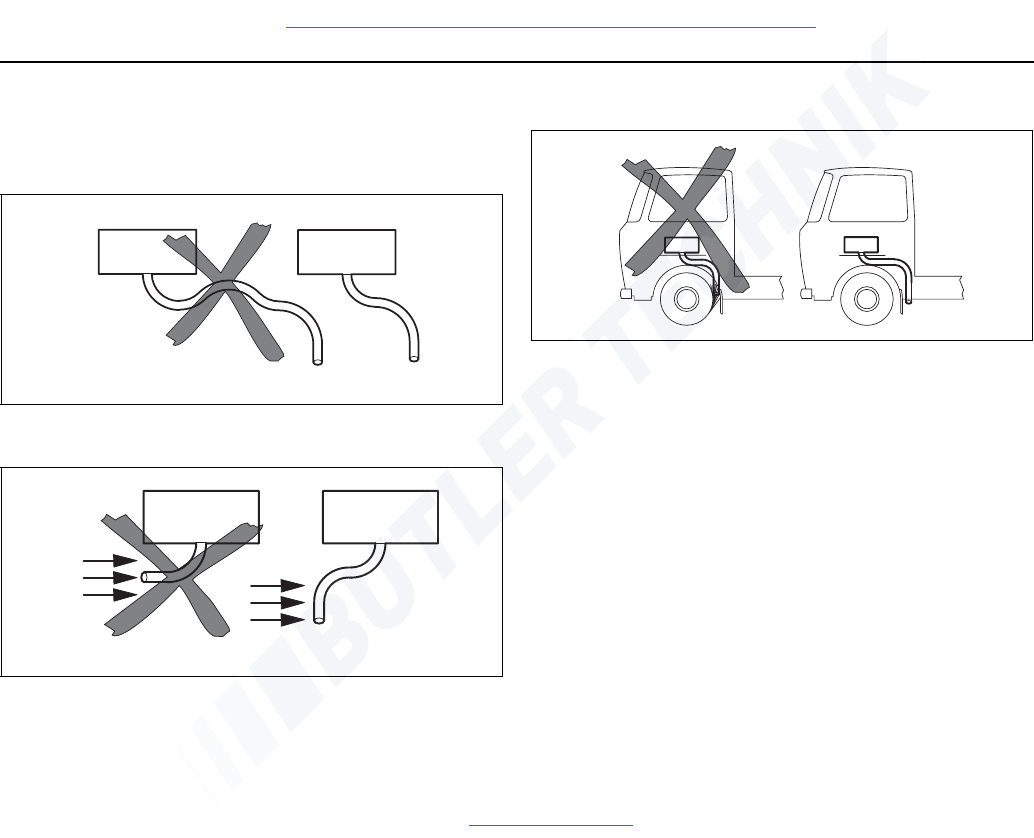
Combustion air inlet and exhaust lines Air Top 2000 ST
60
10 Combustion air inlet and exhaust lines
Both lines are to be installed falling away from the heater. If this is not pos-
sible, a condensate drain hole with a diameter of 4 mm must be made at
its lowest point.
The lines must not point to the front of the vehicle.
The lines must be located so that they cannot become clogged with dirt.
IMPORTANT
If the exhaust pipe ends is other than as shown in the Figure 22 it will pose
a fire risk.
Length of the combustion air inlet and exhaust lines in total:
with silencer: max. 2.0 m
without silencer: max. 5.0 m
NOTE:
If the exhaust line is over 2 m in length the lines must be insulated (to pre-
vent falling below the dewpoint)
Internal diameter of the lines:
Combustion air line: 22 mm
Exhaust line (metal): 22 mm
Minimum bending radius: 50 mm
Total bends:
Combustion air line: max. 270°
Exhaust line: max. 270°
Fig. 19: Prevent the formation of condensate
Fig. 20: The lines must not end pointing towards the front of the
vehicle
Fig. 21: Avoid the lines becoming clogged with dirt
Visit www.butlertechnik.com for more technical information and downloads.
www.butlertechnik.com
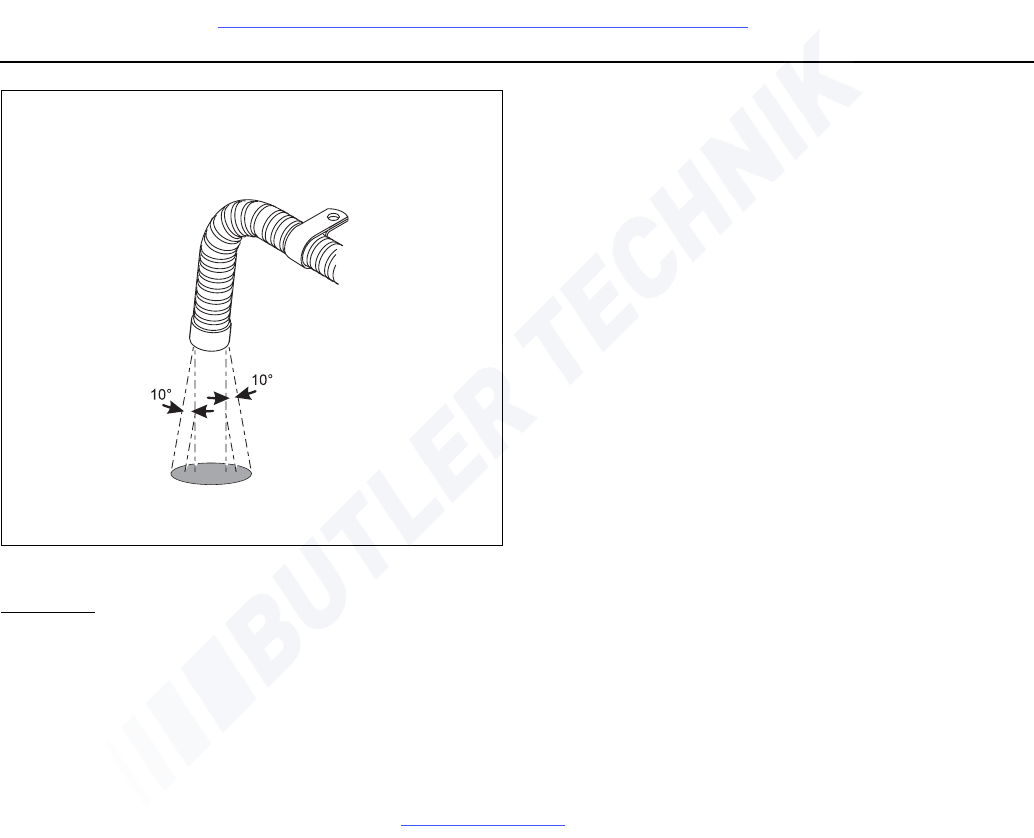
Air Top 2000 ST Combustion air inlet and exhaust lines
61
Only for ADR:
The statutory regulation of ADR (Accord européen relatif au
transport international des marchandises dangereuses par route) governing
the routing of the exhaust line, part 9 para. 9.2.4.7, must be adhered to.
Fig. 22: Exhaust pipe opening
Installation position
An attachment is required no further than 150 mm from the end of the
exhaust pipe to ensure that the angle of 90° ± 10° is achieved
Discharge direction almost vertical 90° ± 10°
Visit www.butlertechnik.com for more technical information and downloads.
www.butlertechnik.com
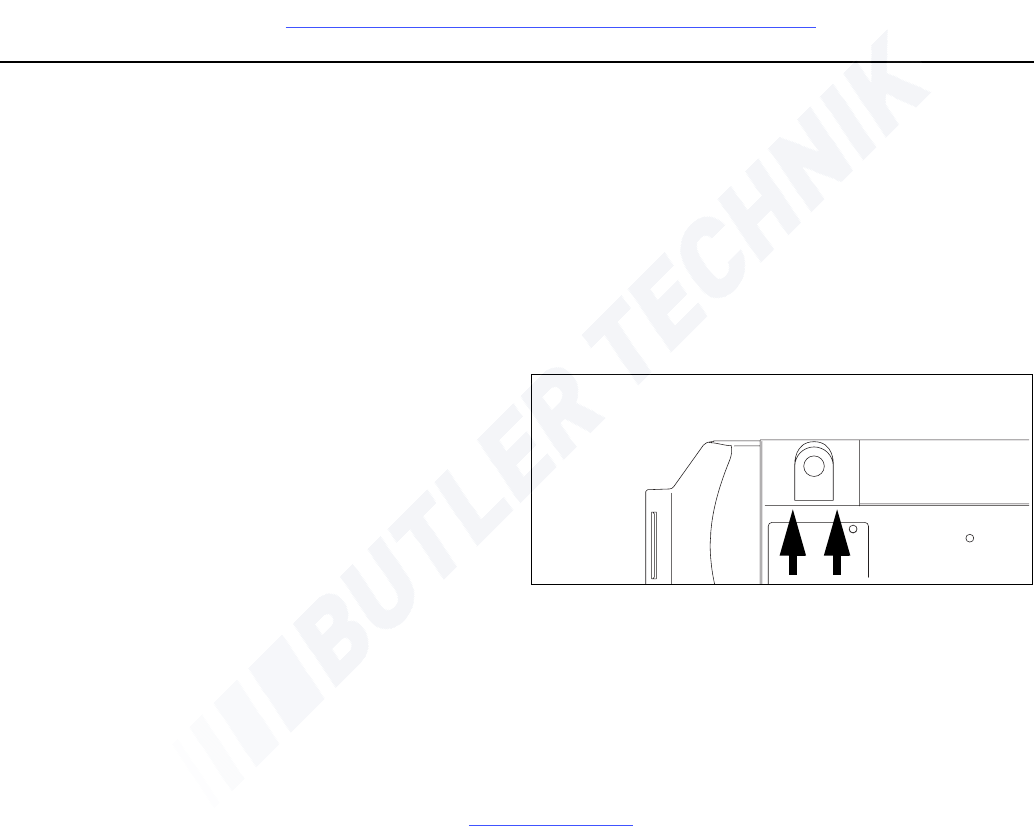
Electrical connections Air Top 2000 ST
62
11 Electrical connections
All the cables that are not required must be insulated.
NOTE:
If the combination timer is used, a touch-sensitive switch may be installed
in the sleeping section to act as a remote control and improved conven-
ience. The connections must be made as shown in the circuit diagrams in
Figure 32.
The electrical connection is made as shown in the system circuit diagram
(Figures 30, 31, 32 and 33).
11.1. Connection for installing the heater in a hazchem vehicle
(ADR)
To install the Air Top 2000 ST D heater in hazchem vehicles, the require-
ments of ADR/RID part 9 para. 9.2.4.7 – Combustion heating systems,
must also be satisfied. The electrical connection is made as shown in the
circuit diagram in Figure 33 or 32.
On vehicles without a power take-off the electrical connection must be
made as shown in the system wiring diagram in Figure33.
NOTE:
The switch S3 must be installed in such a way that a positive potential is
connected to appropriate input of the control module when a pumping de-
vice is switched on.
IMPORTANT
All ADR functions are ineffective if there is no earth at control unit input
X6/3 when the system is switched on.
The control unit continues to run briefly for 40 seconds and then switches
to the "ADR lock-out" operating mode when a positive voltage is connect-
ed to control unit input X6/3 (auxiliary power take-off on) or the engine is
switched off.
IMPORTANT
In accordance with the regulations of the act governing the road/rail haul-
age of hazardous materials, heaters are only allowed to be taken into serv-
ice with a special manually operated switch fitted in the cab.
If the system is equipped with a combination timer, ensure that contact 4
on the combination timer remains free. The heater can then only be taken
into service using the immediate heat button.
The use of other timers in ADR vehicles is not permitted.
11.2. Heater connection
To connect the wiring harness, remove the control unit cover on the heater
and connected the wiring harness plug to the control unit.
NOTE:
Raise the control unit cover on both sides using a blunt blade (Figure 23
arrows).
Before using the heater for the first time fit the control unit cover to pre-
vent the illegal escape of hot air (heater overheating).
Fig. 23: Removing control unit cover
Visit www.butlertechnik.com for more technical information and downloads.
www.butlertechnik.com
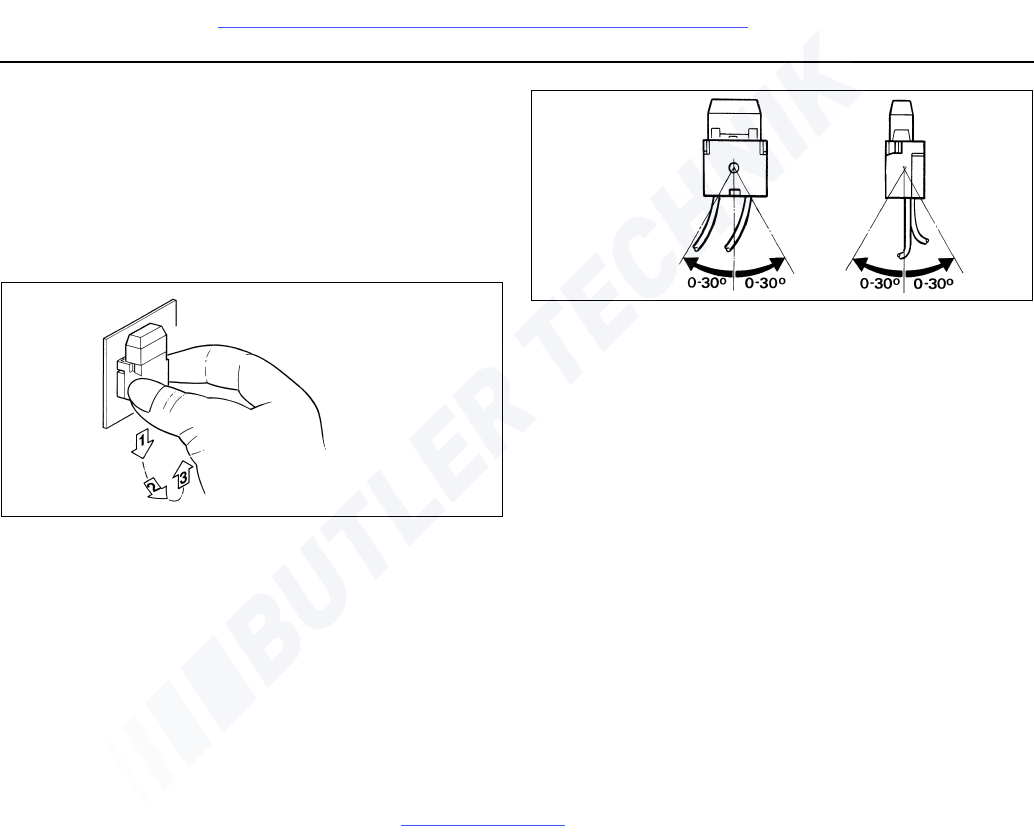
Air Top 2000 ST Electrical connections
63
The cable passage can be placed at either the left or right side.
To ensure that the cable passage in the control unit cover seals perfectly,
the cable grommet is to be adjusted appropriately on the wiring harness.
11.3. Supply voltage connection
Ideally from the vehicle’s central electrical system.
An additional blade terminal fuse holder is to be fitted to protect
the heater (supplied with the heater). The fuse holder may only be
installed in the interior of the vehicle.
Fig. 24: Remove the fastening plate on the fuse holder
Fig. 25: Fuse holder, installation position
F = 15 A
(12 and 24V)
Visit www.butlertechnik.com for more technical information and downloads.
www.butlertechnik.com
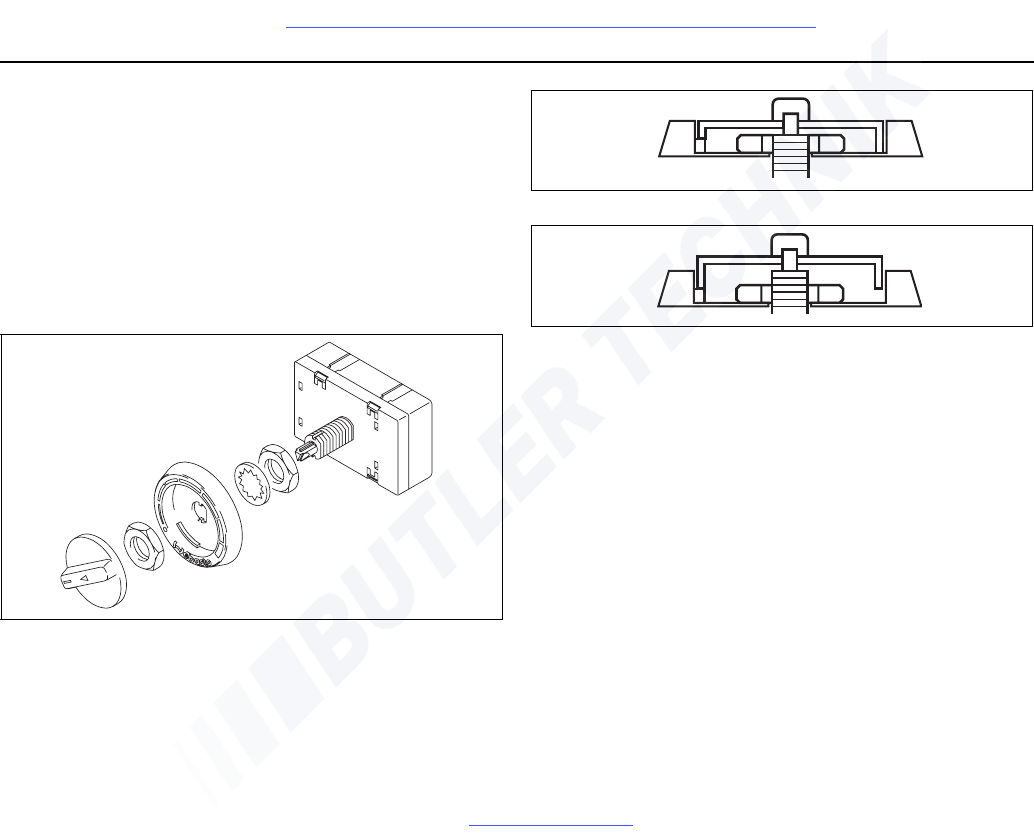
Electrical connections Air Top 2000 ST
64
11.4. Control element connection
The wiring harness is prepared for connection to the control element.
Simply pull on connector housing to unplug the connector.
The connector housing can be locked (self-locking action) by simply pulling
on the wiring harness.
NOTE:
The fibre optic cable must be in contact with the rotary knob
NOTE:
As an option an external temperature sensor may be installed in the pas-
senger cabin (see page 52).
Fig. 26: Control element
Fig. 27: Installation of the control element
Fig. 28: Installation of the control element (incorrect)
Visit www.butlertechnik.com for more technical information and downloads.
www.butlertechnik.com
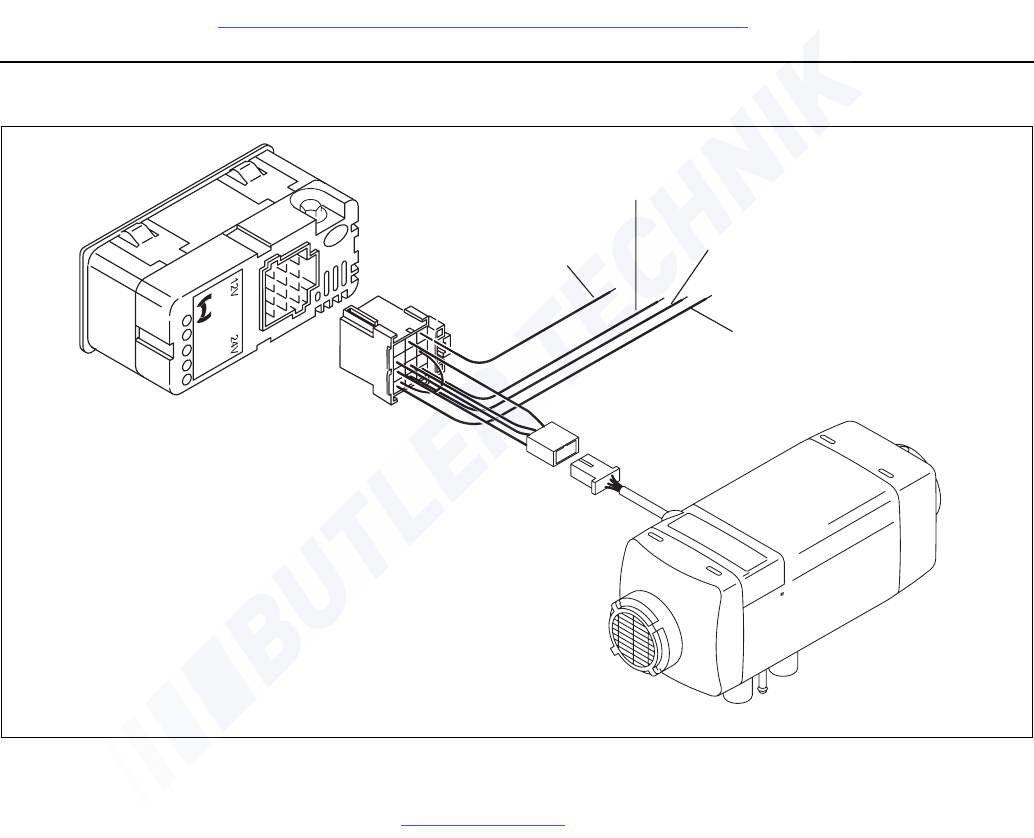
Air Top 2000 ST Connection diagram/Circuit diagram
65
12 Connection diagram/Circuit diagram
Fig. 29: Air Top 2000 ST with combination timer connection diagram
Adapter wiring harness
red: Terminal 30
grey: Terminal 58
black: Terminal 15
brown: Terminal 31
Combination timer 1531
Visit www.butlertechnik.com for more technical information and downloads.
www.butlertechnik.com
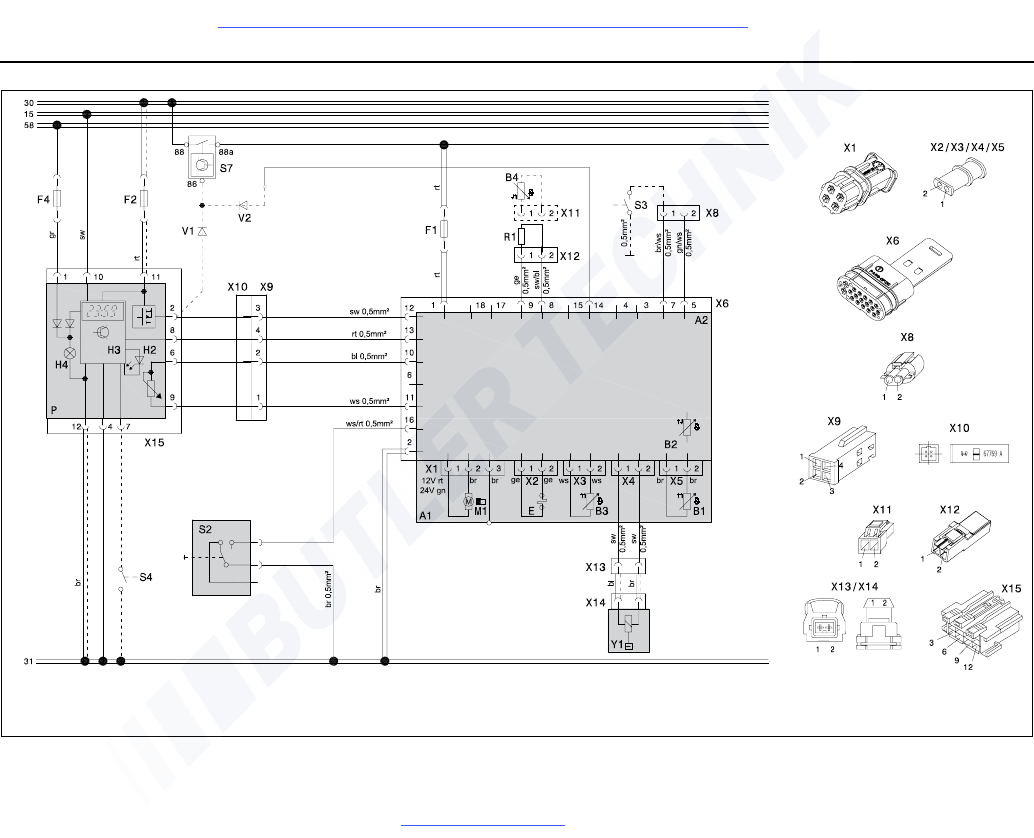
Air Top 2000 ST Connection diagram/Circuit diagram
69
Fig. 33: System wiring diagram for the Air Top 2000 ST, 12 V/24 V with combination timer and electrical battery isolation switch, for legend
see pages 29 and 33
Visit www.butlertechnik.com for more technical information and downloads.
www.butlertechnik.com
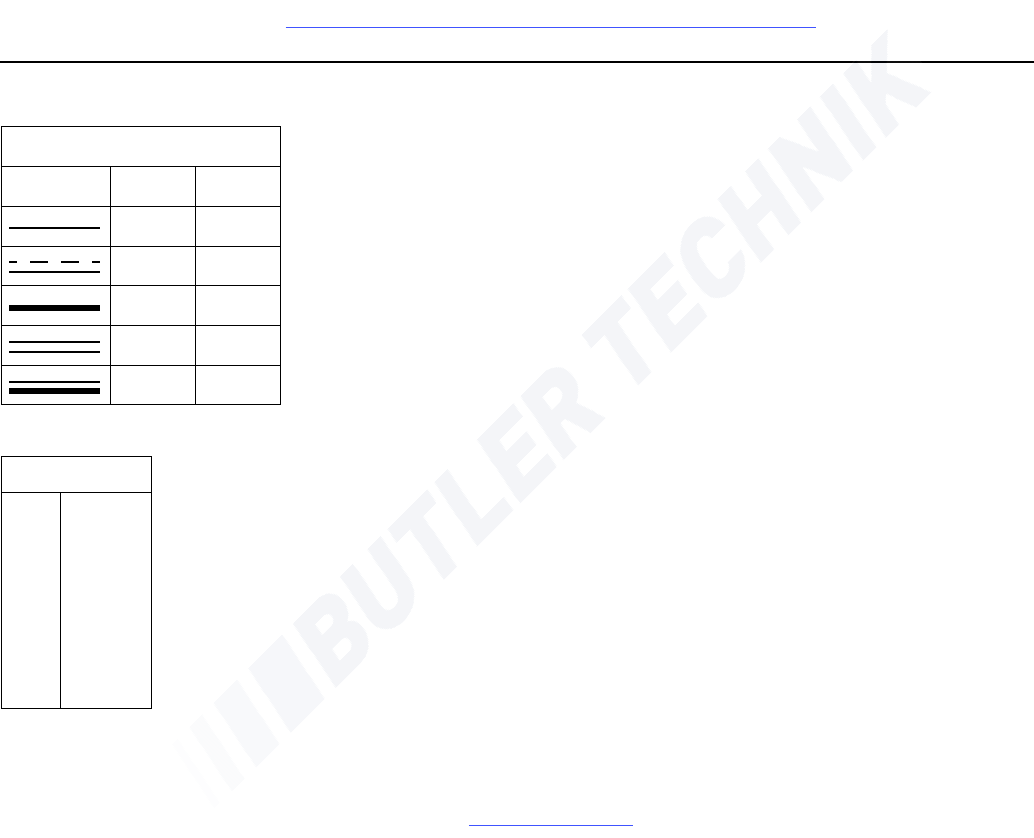
Legend for circuit diagrams Air Top 2000 ST
70
13 Legend for circuit diagrams
Cable cross-sections
< 7.5 m 7.5 - 15 m
0.75 mm21.0 mm2
1.0 mm21.5 mm2
1.5 mm22.5 mm2
2.5 mm24.0 mm2
4.0 mm26.0 mm2
Cable colours
bl
br
ge
gn
gr
or
rt
sw
vi
ws
blue
brown
yellow
green
grey
orange
red
black
violet
white
Visit www.butlertechnik.com for more technical information and downloads.
www.butlertechnik.com

Air Top 2000 ST Legend for circuit diagrams
71
Item Description Comment
A1 Heater Air Top 2000 ST
A2 Control module Control unit 1574
B1 Flame sensor for petrol heaters only
B2 Temperature sensor internal
B3 Overheating sensor Overheating guard
B4 Temperature sensor External
EGlow plug
F1 Fuse 15 A 12 V/24 V
(max. 20 A)
Flat fuse SAE J 1284
F2 Fuse 4 A Blade fuse SAE J 1284
not contained in wiring harness
F4 Fuse 4 A Blade fuse SAE J 1284
not contained in wiring harness
F5 Fuse Blade fuse SAE J 1284
Value in [A] to be selected de-
pending on line cross-section
not contained in wiring harness
H1 LED, green (in item S1) Indicator
H2 LED red (in item P) Light in immediate heat button,
ready indicator,
Switch-on indicator
H3 Heating symbol in the display
(in item P)
Indicator
H4 Light (in item P and S) Display and button lighting
H5 Light bulb/LED Switch-on indicator pumping de-
vice
KRelay
with free-wheeling diode
for vehicle fan
(only valid with OE version)
M1 Motor Combustion and hot air fan
M3 Motor Vehicle fan
PCombination Timer 1531 Timer and setpoint generator
R1 Resistor With internal temperature sensor
only
S1 Basic heater control On/Off switch and setpoint gen-
erator
S2 Switch Ventilation
S3 Switch CO2 setting
S4 Push button External instant heat button
S5 Switch Auxiliary drive/Pumping device
S6 Switch, single or two-pin Isolation switch
S7 Battery isolation switch Electronically controlled isolation
switch
X8-
X13
Plug connector
X14 Plug connector to item Y1
X15 Plug connector to item P
Y1 Metering pump
Y2 Solenoid valve/pump Auxiliary drive/Pumping device
Item Description Comment
Visit www.butlertechnik.com for more technical information and downloads.
www.butlertechnik.com
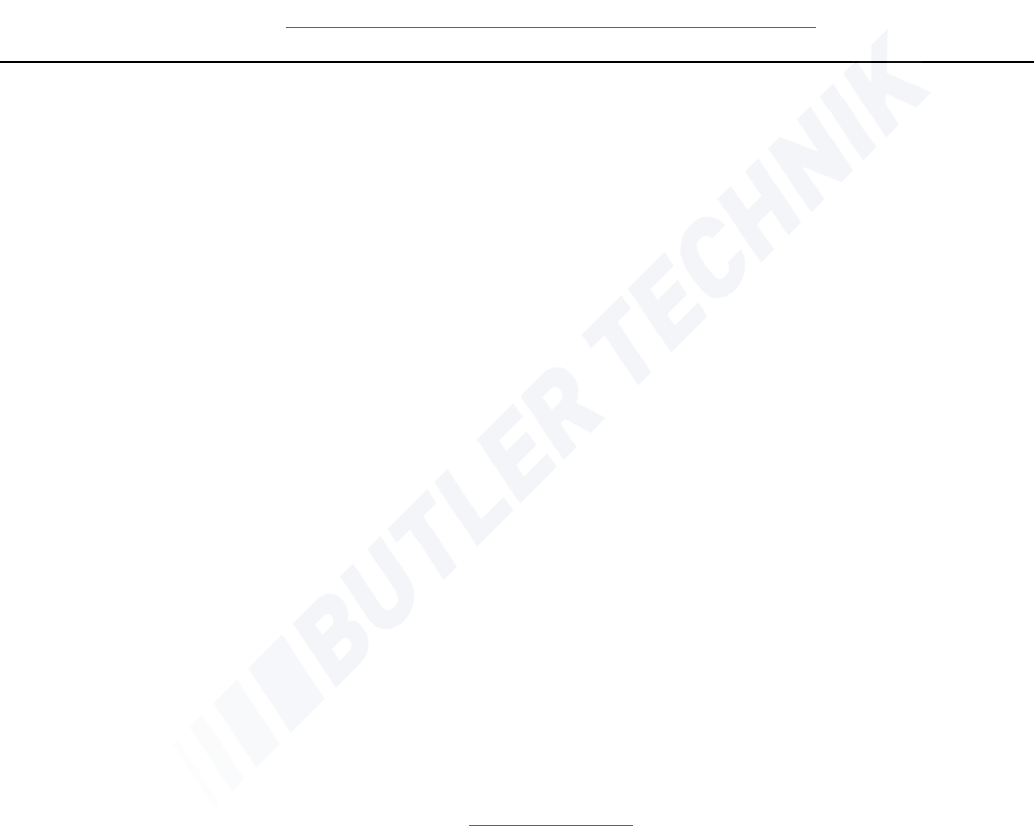
Initial start-up Air Top 2000 ST
72
14 Initial start-up
After you have installed the heater, bleed the fuel supply system carefully.
NOTE:
As a result of the low fuel consumption the heater must be switched on
several times to fill the fuel line.
Until the fuel lines have been filled the heater may switch into a fault lock-
out for safety reasons - see chapter 15, "Fault lock-out".
Conduct a trial of the heater to check all the connections for leaks and to
ensure that they are secure. If the heater suffers a fault during operation,
the fault must be located and remedied.
Visit www.butlertechnik.com for more technical information and downloads.
www.butlertechnik.com

Air Top 2000 ST Fault lock-out
73
15 Fault lock-out
The control unit has identified errors on individual heater components and
faults during the operation.
The heater is shut down (fault lock-out) if:
– No or incorrect start
– Temperature sensor defective
– Overheating sensor interrupt or short circuit
– Overheating sensor installed incorrectly
– Glow plug interrupt or short circuit
– Fan motor overload or blocked or short circuit or interrupt
– Error in the metering pump or overheating guard circuit
(start phase only)
– Undervoltage < 10.5 or overvoltage > 16 V, longer than 20 seconds (for
12 V heater)
– Undervoltage < 20.5 or overvoltage > 31 V, longer than 20 seconds (for
24 V heater)
– Control unit defective
–Overheating
– Flame monitor defective (petrol heater)
The fuel supply is stopped if the heater overheats.
The heater continues to run in the same way as if it is switched off manu-
ally.
After it stops the control unit will be set to fault lock-out.
The overheating is indicated by the indicator flashing 10 times.
Rectify the cause of the fault.
To reset the fault switch the heater on and off briefly (at least 2 seconds).
If serious malfunctions such as overheating or failure to start reoccur, the
heater is locked (F 12) and can be put back into service by disconnecting
the power supply with the heater switched on (e.g. by removing and re-
inserting fuse).
Visit www.butlertechnik.com for more technical information and downloads.
www.butlertechnik.com
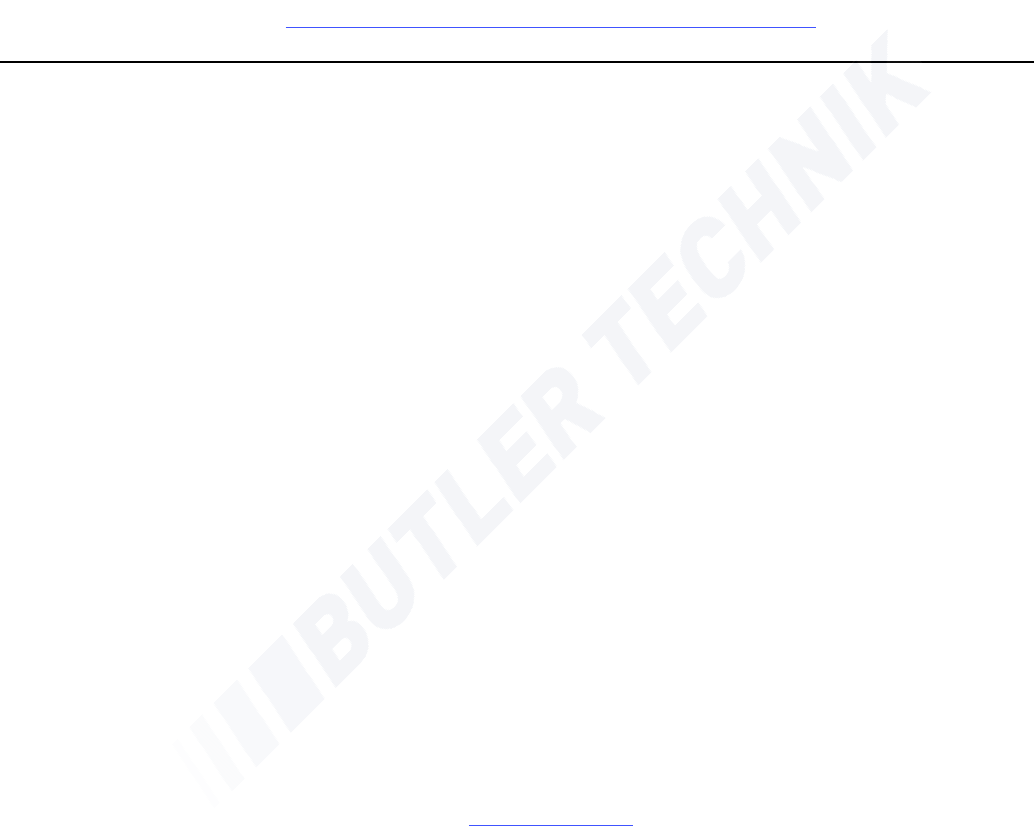
Fault lock-out Air Top 2000 ST
74
15.1. Error code output
NOTE:
The error code is output if the heater is fitted with a control element after
an error has occurred by the switch-on indicator/error code indicator flash-
ing. After 5 seconds of fast flashing, the error code will be output by a se-
quence of long flash pulses, the number of flashes is shown in the table
below.
If the heater is fitted with a combination timer, an error message will ap-
pear on the display of the timer after a fault occurs: If the control element
is used the error number is indicated by the indicator light flashing:
F 00 Control unit error / incorrect data set / customer bus defective
F 01 No start (no flame formation)
F 02 Flame failure (repeated >3)
F 03 Undervoltage or overvoltage
F 04 Premature flame recognition
F 05 Flame monitor (petrol heater) interrupt or short circuit
F 06 Temperature sensor interrupt or short-circuit
F 07 Metering pump interrupt or short circuit
F 08 Fan motor interrupt or short circuit overload or blocked
F 09 Glow plug interrupt or short circuit
F 10 Overheating
F 11 Overheating sensor interrupt or short circuit
F 12 Heater lock-out
F 14 Overheating sensor incorrect position
F 15 Setpoint generator interrupt
Visit www.butlertechnik.com for more technical information and downloads.
www.butlertechnik.com
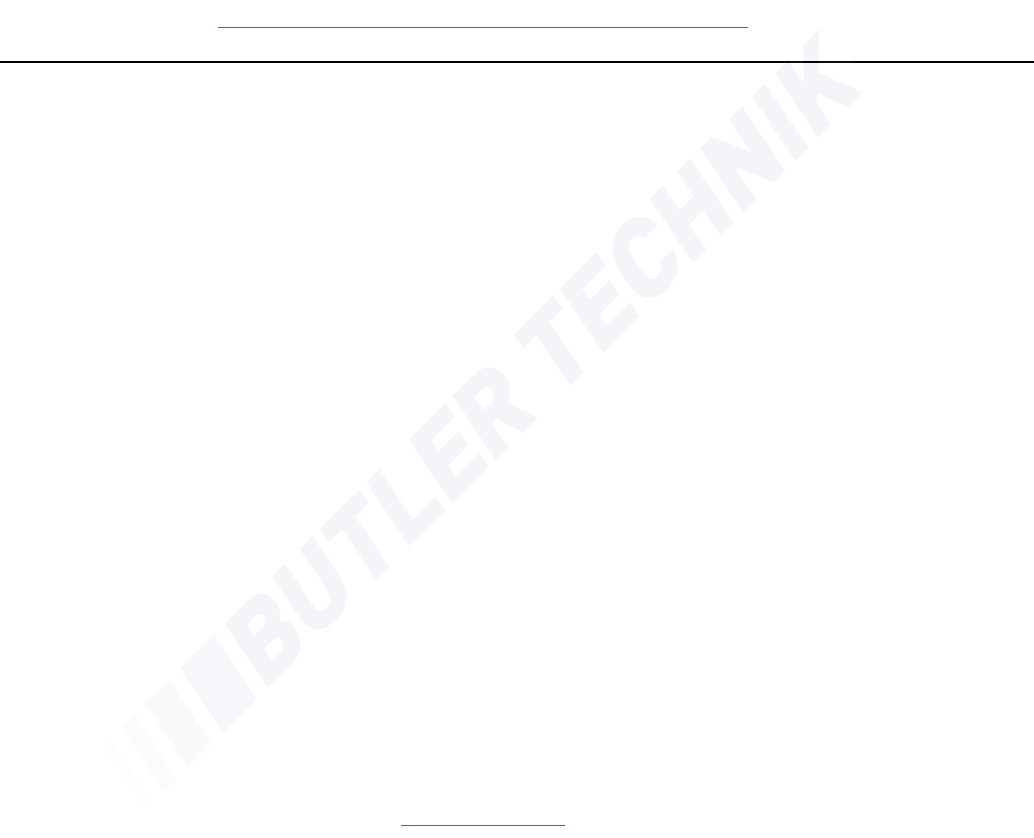
Air Top 2000 ST Technical data
75
16 Technical data
Except where limit values are specified, the technical data refer to the usual
heater tolerances of ± 10 % at an ambient temperature of + 20 °C and at
the rated voltage and in rated conditions.
16.1. Electrical components:
Control unit, motor, metering pump, lamp in the timer and glow plug /
flame monitor are designed for either 12 V or 24 V.
The timer, overheating sensor and temperature sensor component are not
dependent on voltage.
16.2. Fuel for Air Top 2000 ST B (petrol):
The fuel specified by the manufacturer must be used.
16.3. Fuel for Air Top 2000 ST D (diesel/ EL heating oil):
The diesel fuel specified by the manufacturer in accordance with DIN
EN590 must be used. Class EL heating oil (not L heating oil) may also be
used as long as it complies to the normal quality available on the German
market pursuant to DIN 51603.<
We know of no negative influences due to additives.
If fuel is extracted from the vehicle’s tank, follow the additive instructions
issued by the vehicle manufacturer.
If you change to low-temperature fuel, the heater must be operated for ap-
prox. 15 minutes so that the fuel system is filled with the new fuel.
The Air Top 2000 ST D heater is also licensed for use with PME (bio-diesel),
which complies with DIN EN 14214.
Visit www.butlertechnik.com for more technical information and downloads.
www.butlertechnik.com
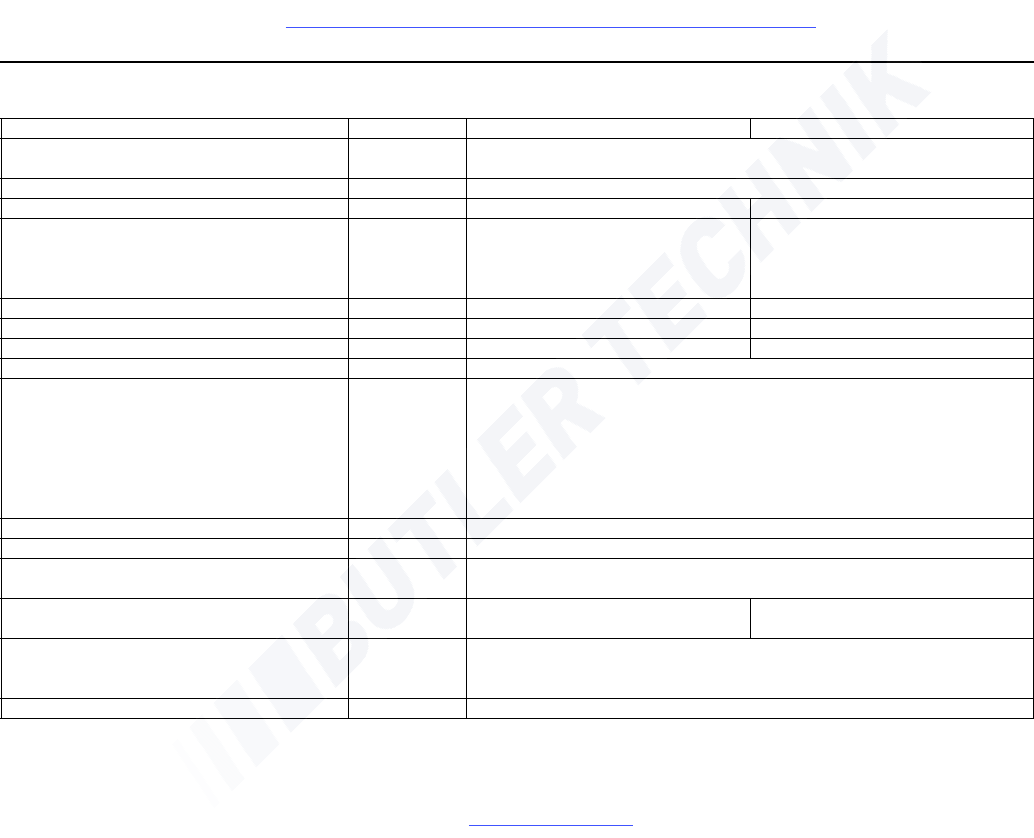
Technical data Air Top 2000 ST
76
Heater Operation Air Top 2000 ST B Air Top 2000 ST D
Type test permit EMC
heater
e1*72/245*2009/19*1085*__
e1*2001/56*2006/119*0022*__
Model Air heater with evaporator burner
Heat output Control range 1.0 - 2.0 kW 0.9 - 2.0 kW
Fuel Petrol
EN 228
DIN 51625
Diesel/PME
EN 590
DIN 51603
DIN EN 14214
Fuel consumption Control range 0.1 - 0.2 kg/h (0.14 - 0.27 l/h) 0.1 - 0.21 kg/h (0.12 - 0.24 l/h)
Rated voltage 12 V 12/24 V
Operating voltage range 10.5 - 16 V 10.5 - 16 / 20.5 - 31 V
Rated power consumption Control range 14 - 29 W
Max. ambient temperature:
Heater: - Operation
- Storage
Metering pump: - Operation
- Storage
Control Panel: - Operation
- Storage
-40 to + 40 °C
-40 to + 85 °C
-40 to + 20 °C
-40 to + 85 °C
-40 to + 75 °C
-40 to + 85 °C
Maximum combustion air inlet temperature -40 to + 20 °C
Adjustment range for interior temperature Control range +5 to + 35 °C
Delivery rate for hot air
at fan speed
against
0.5 mbar
max. 93 m3/h
at 4750 rpm
CO2 in exhaust gas (permitted function range) 1 kW
2 kW
5.0 - 8.0 %
9.0 - 12.5 %
5.0 ... 8.0 %
9.0 ... 12.5 %
Heater dimensions Length 311 ± 2 mm
Width 120 ± 1 mm
Height 121 ± 1 mm
Weight 2.6 kg
Visit www.butlertechnik.com for more technical information and downloads.
www.butlertechnik.com
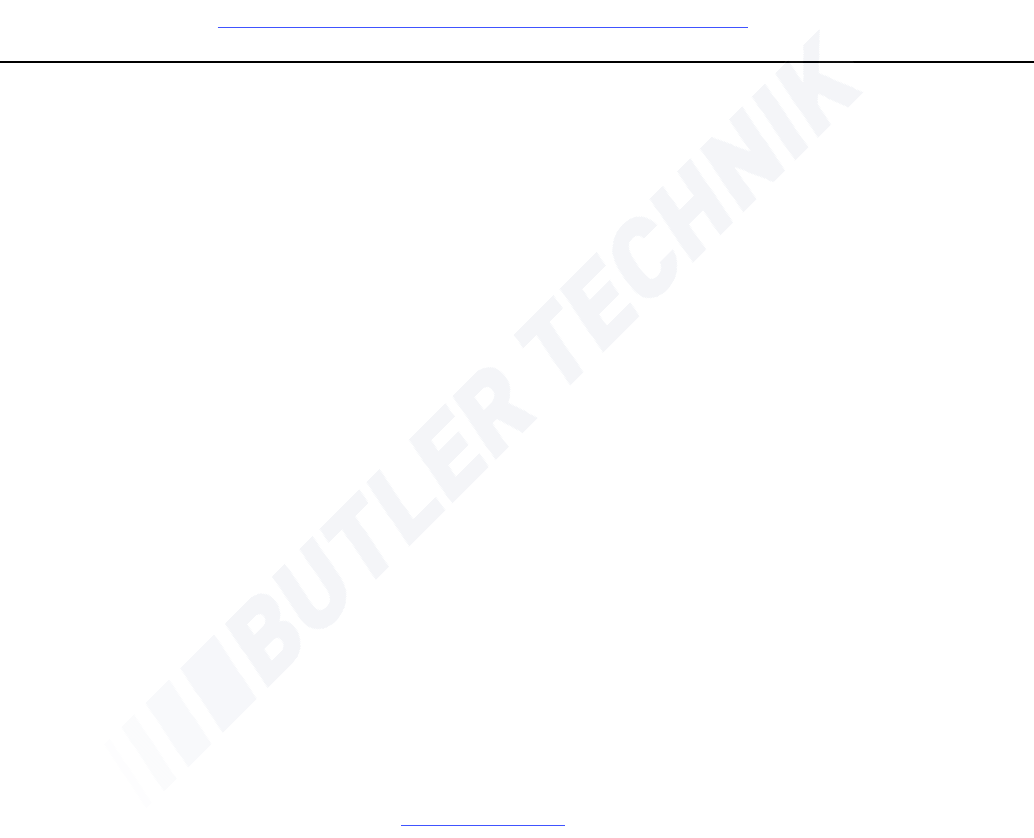
Air Top 2000 ST Version
77
17 Version
Air Top 2000 ST-B (petrol)
Air heater for petrol (12 V)
Air Top 2000 ST-D (diesel)
Air heater for diesel/EL heating oil (12 or 24 V)
Visit www.butlertechnik.com for more technical information and downloads.
www.butlertechnik.com
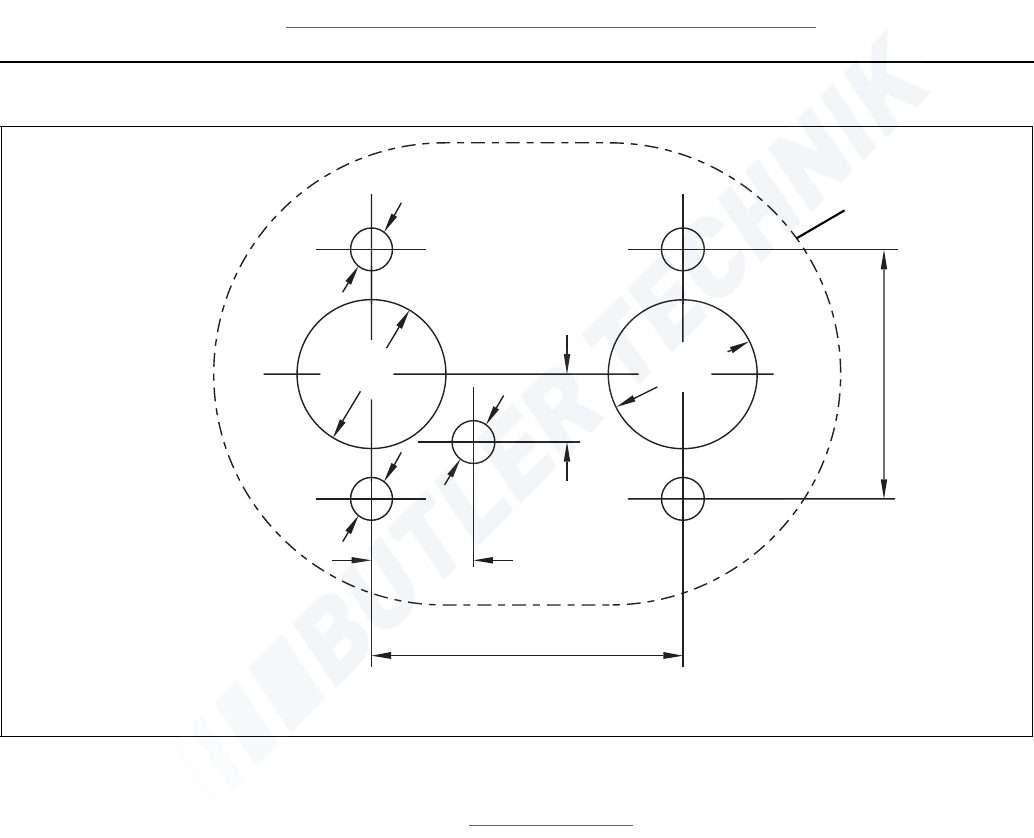
Drilling template Air Top 2000 ST
78
18 Drilling template
Fig. 34: Drilling template
44
ø26 ø26
12
55
18
ø7,5
ø7,5
ø7,5
NOTE:
Max. base unevenness around
the seal: 1 mm
Seal
Visit www.butlertechnik.com for more technical information and downloads.
www.butlertechnik.com

Visit www.butlertechnik.com for more technical information and downloads.
www.butlertechnik.com
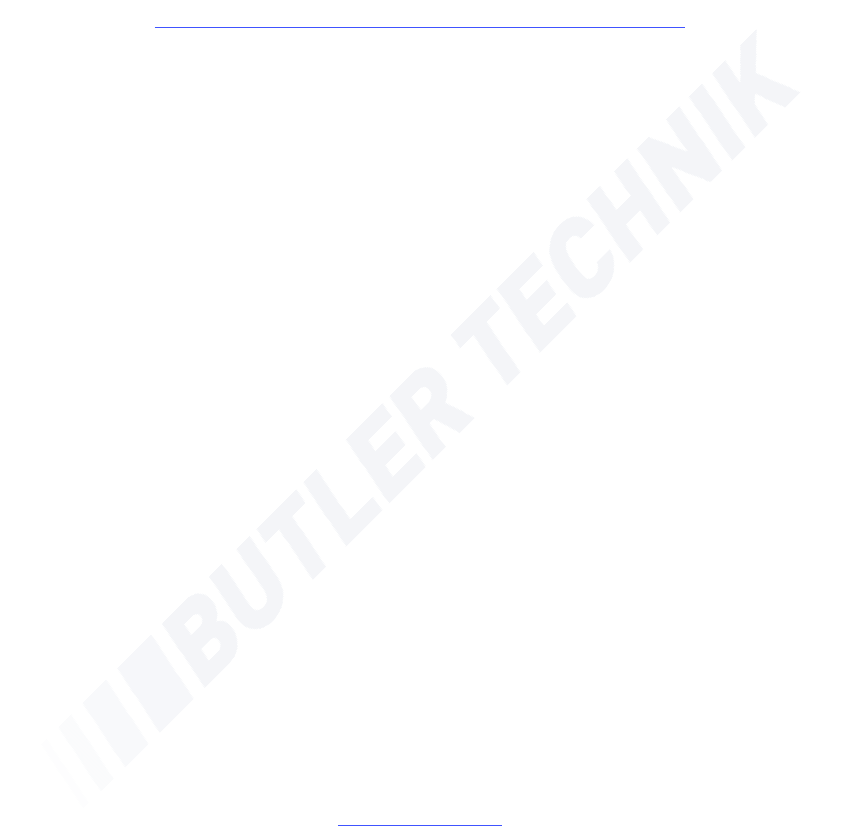
Die Betriebsanweisung vor Inbetriebnahme des Heizgerätes unbedingt lesen.
The Operating Instructions must be read before attempting to start up the heater.
De gebruiksaanwijzing moet beslist voor inbedrijfstelling van het verwarmingstoestel
gelezen worden.
Im Fall einer mehrsprachigen Version ist Deutsch verbindlich.
In multilingual versions the German language is binding.
Bij een meertalige versie is de Duitse versie bindend.
Ident-Nr. 9010298D • 11/09 • Errors and omissions excepted • Printed in Germany • © Webasto AG, GCS 2009
Webasto AG
Postfach 80
D - 82131 Stockdorf
Germany
National:
Hotline: 01805 93 22 78
(€ 0,14 aus dem deutschen
Festnetz)
Hotfax: 0395 5592 353
Hotmail: hotline@webasto.de
www.webasto.de
International:
www.webasto.com
Visit www.butlertechnik.com for more technical information and downloads.
www.butlertechnik.com
